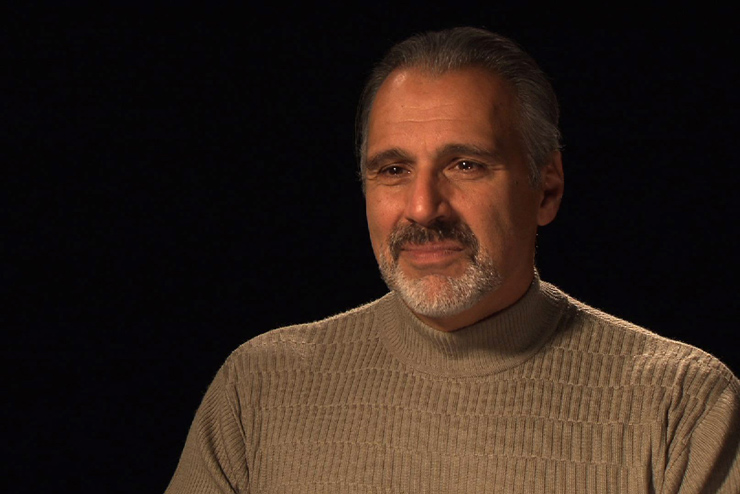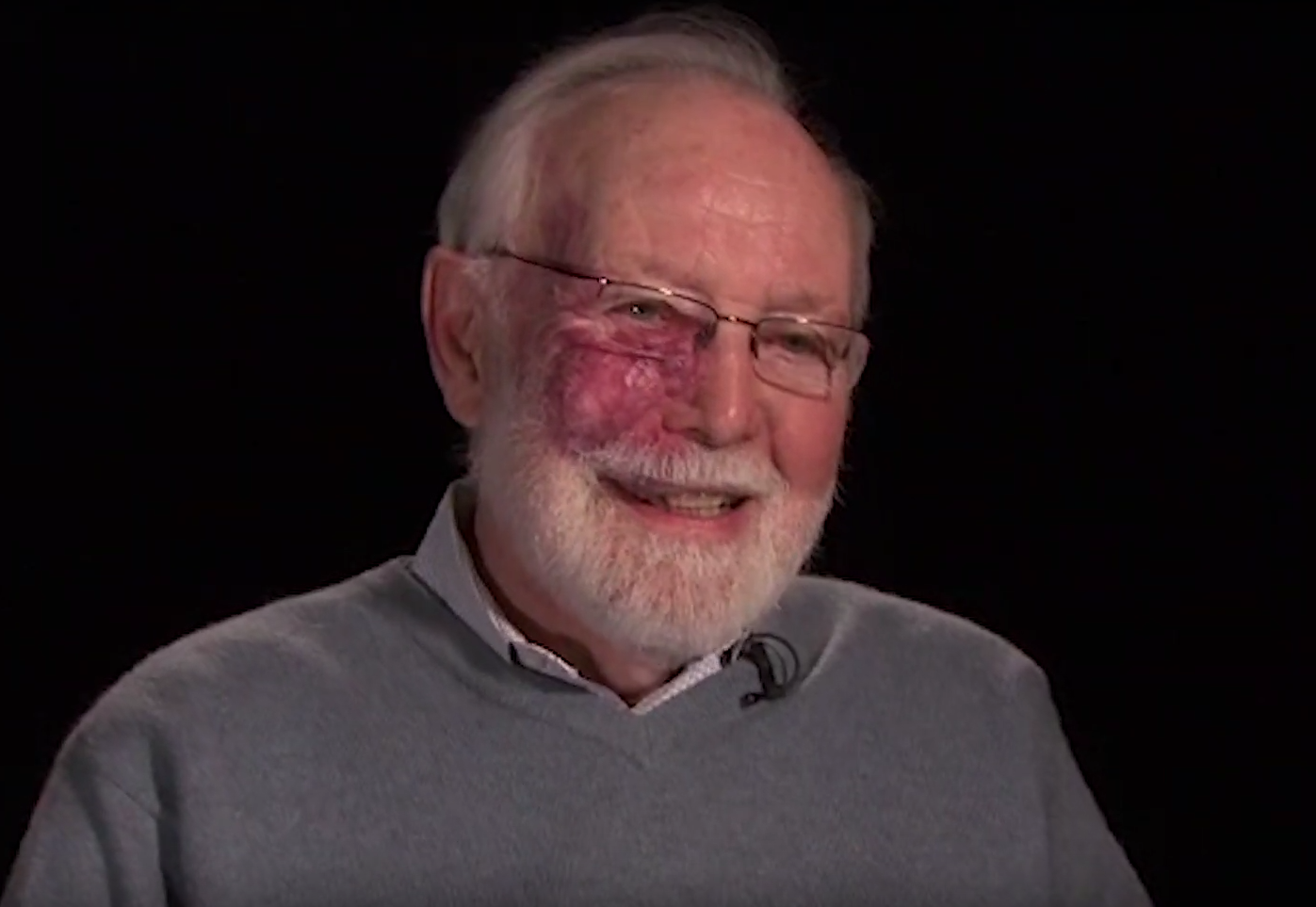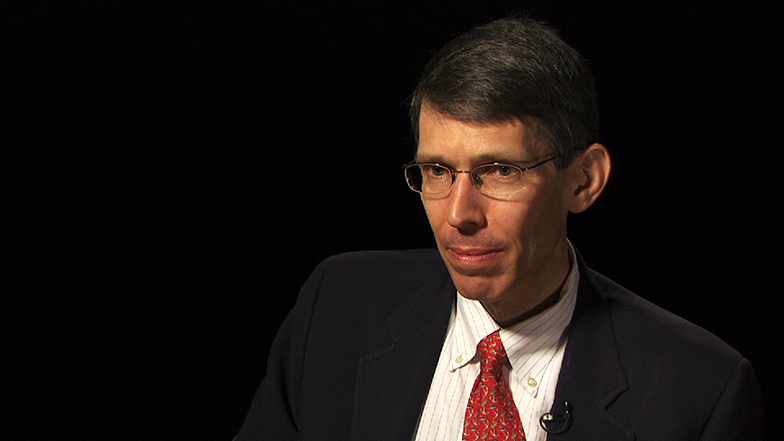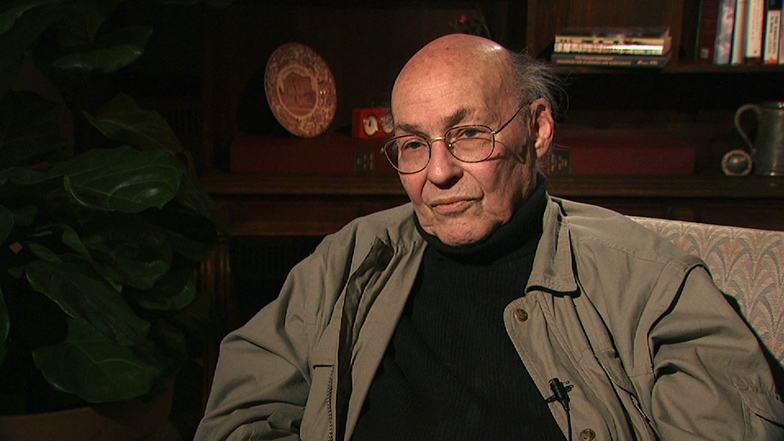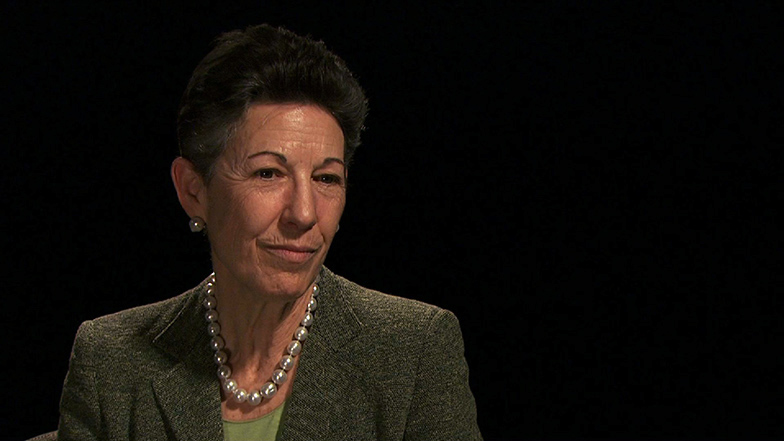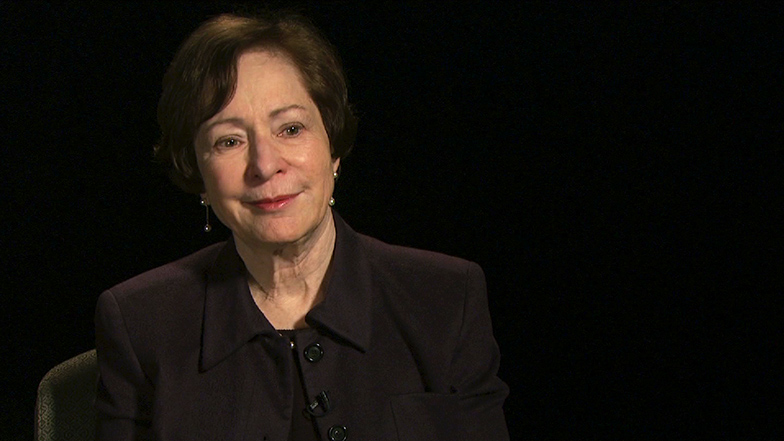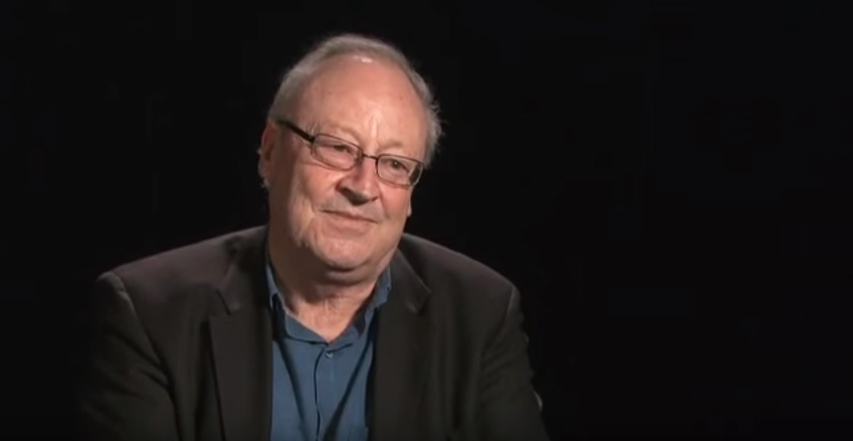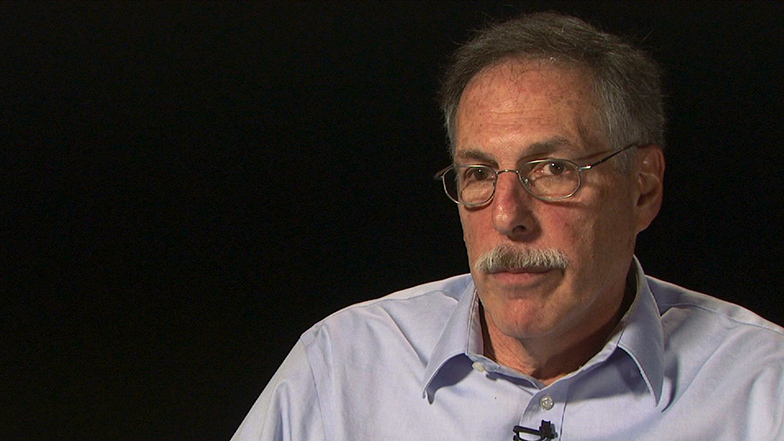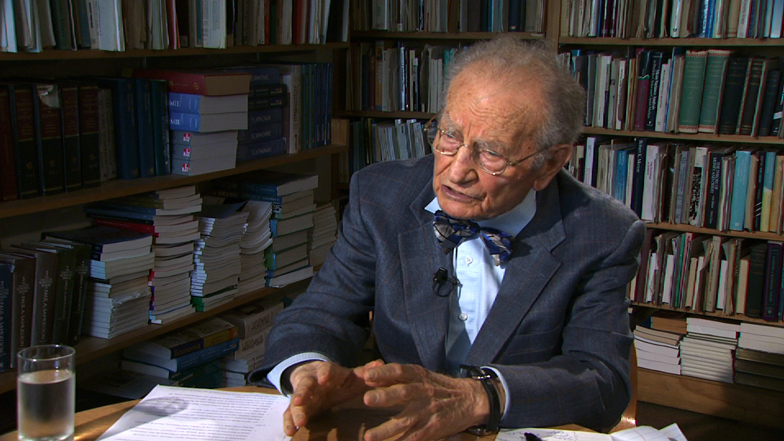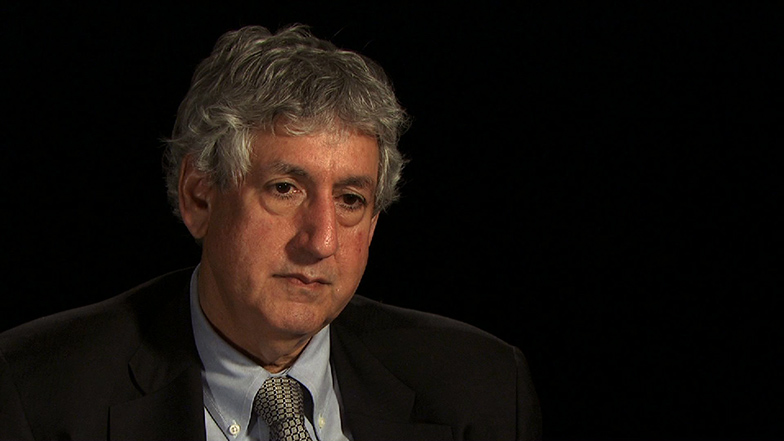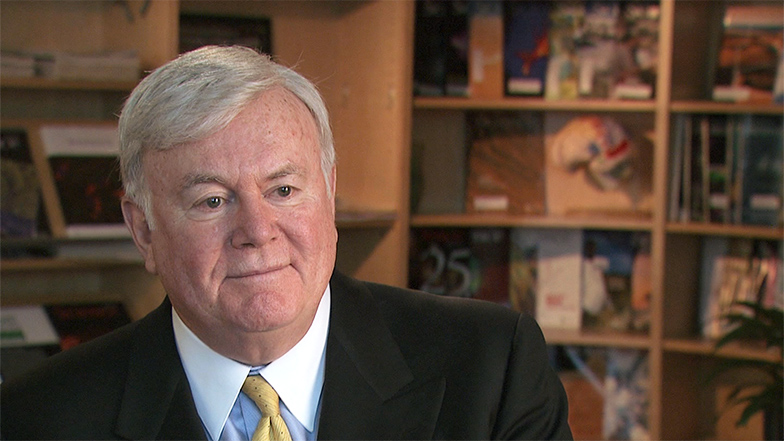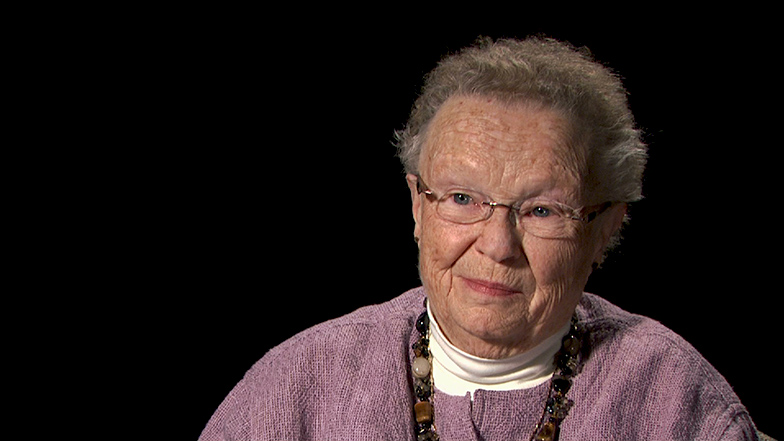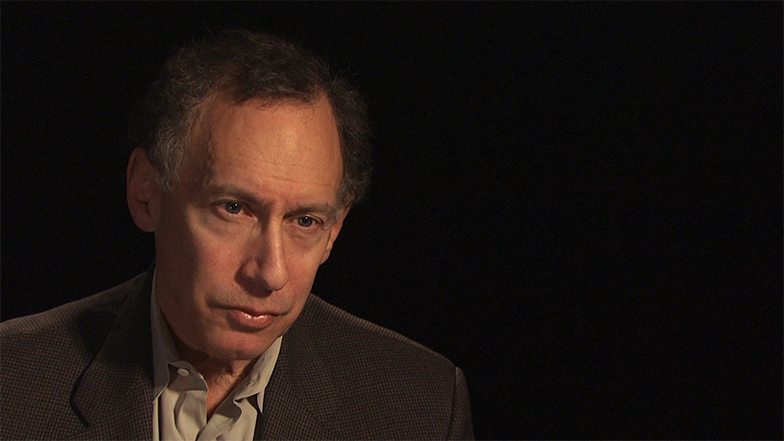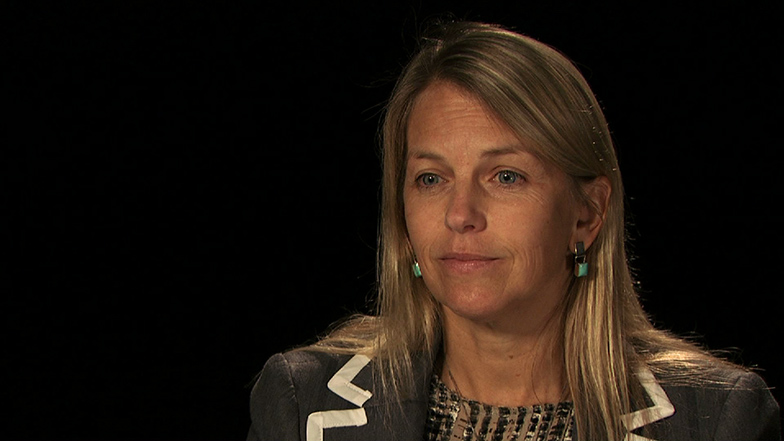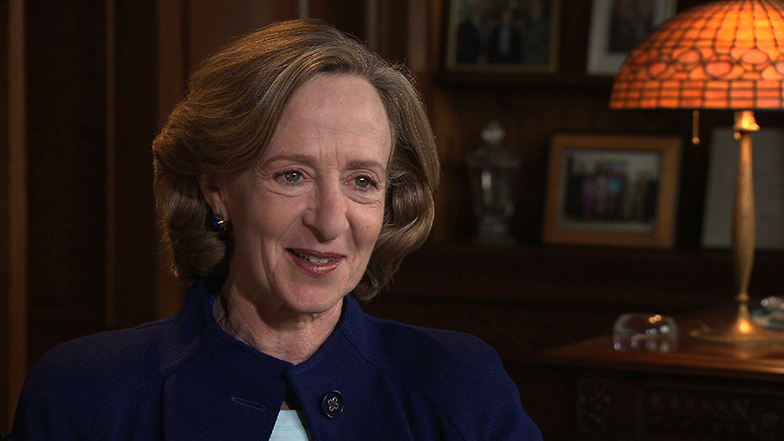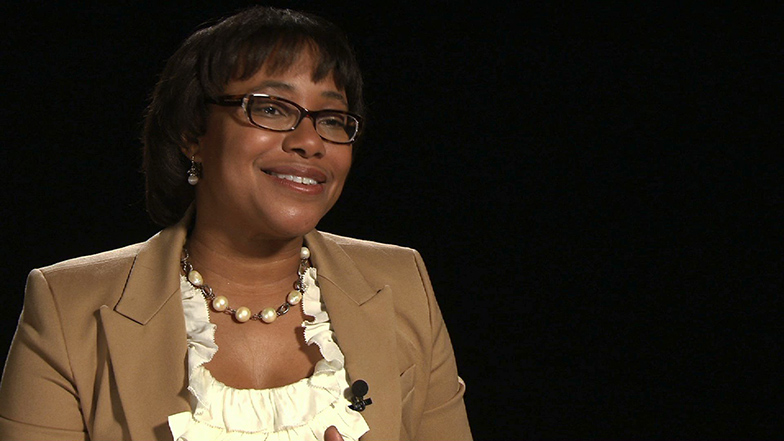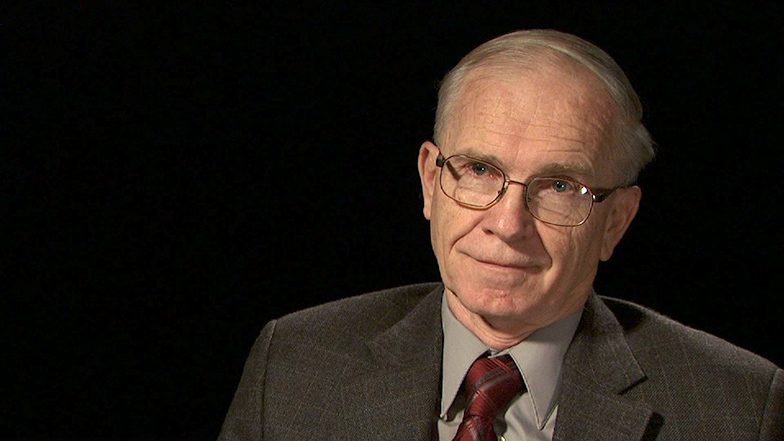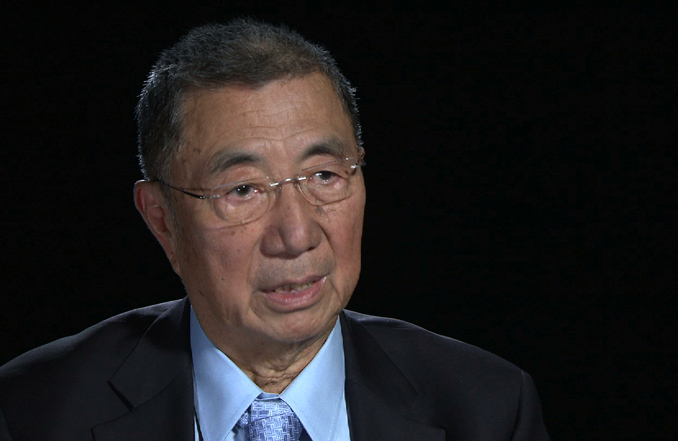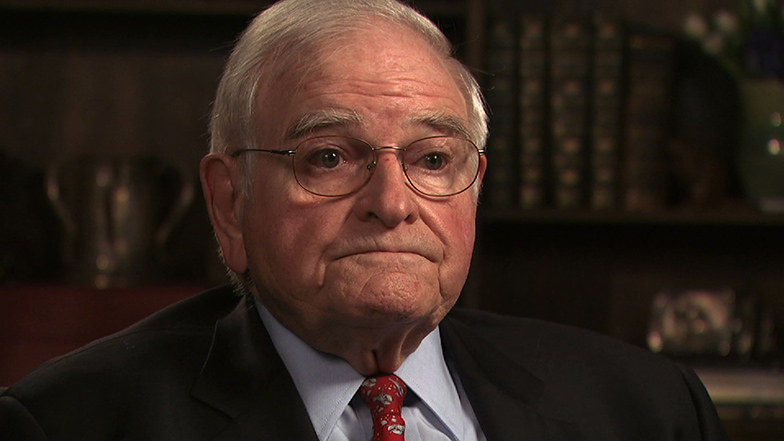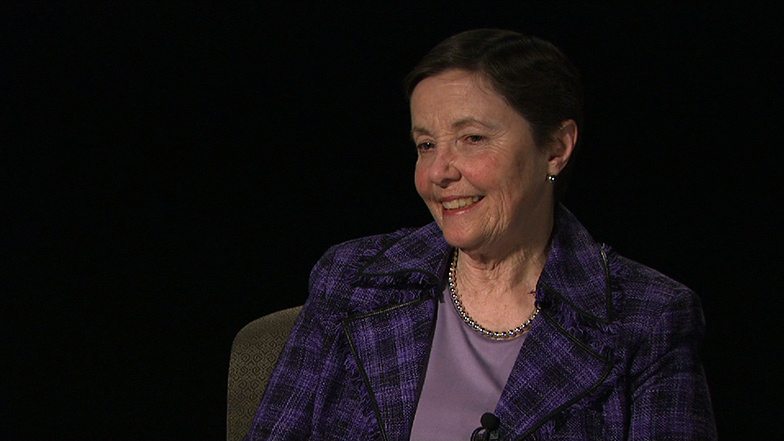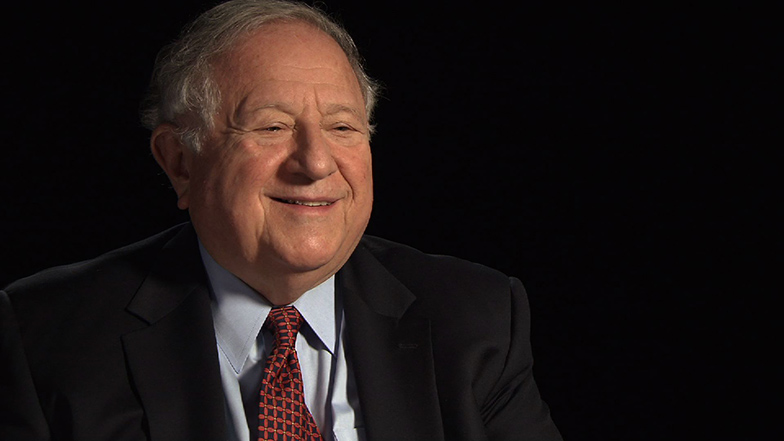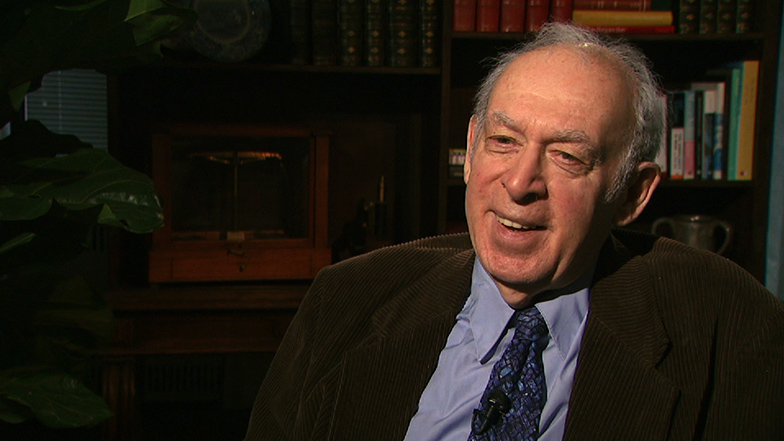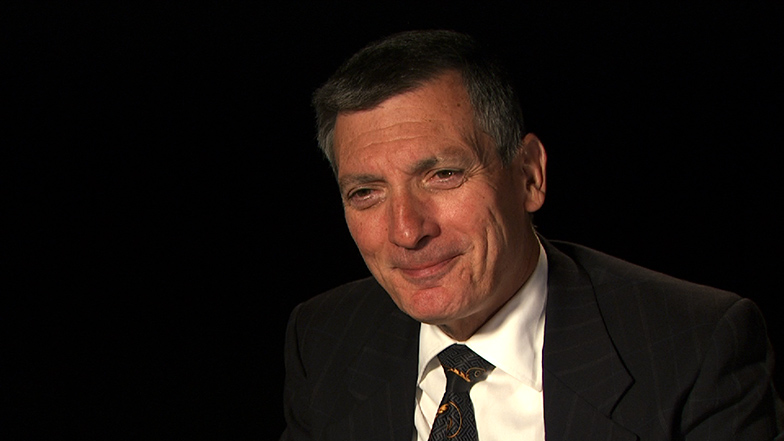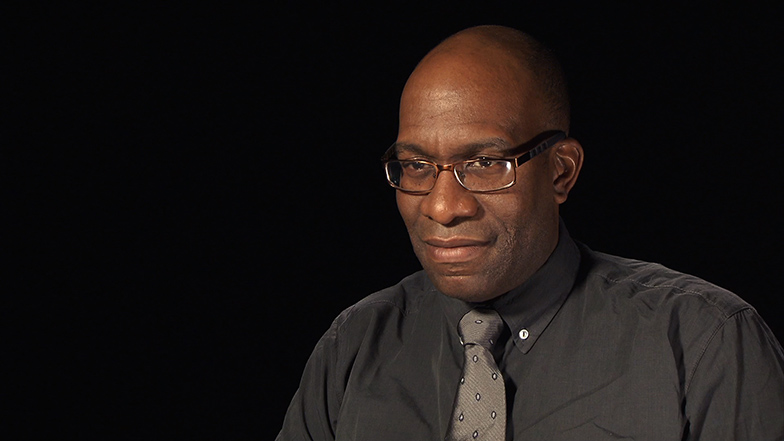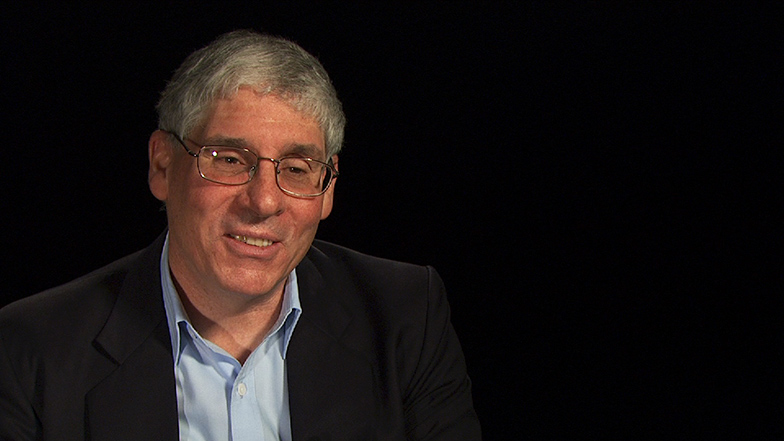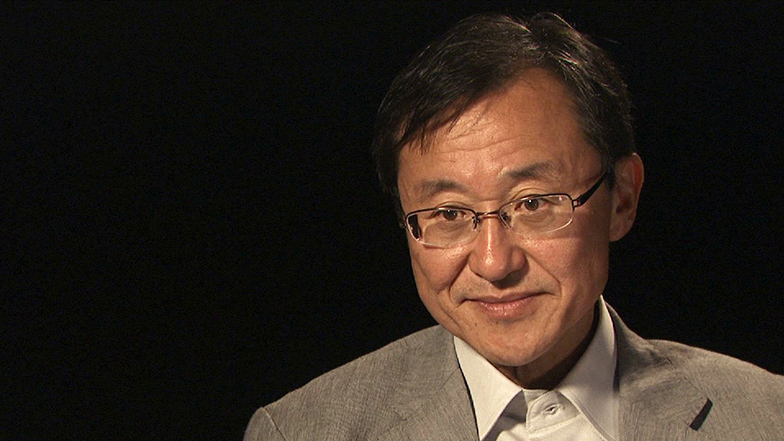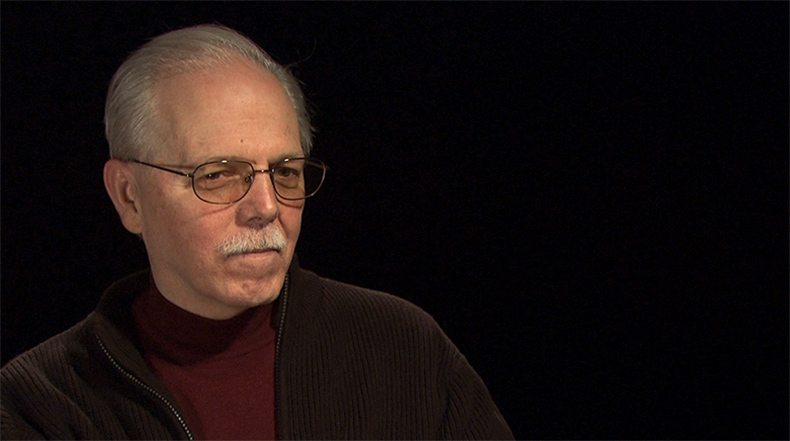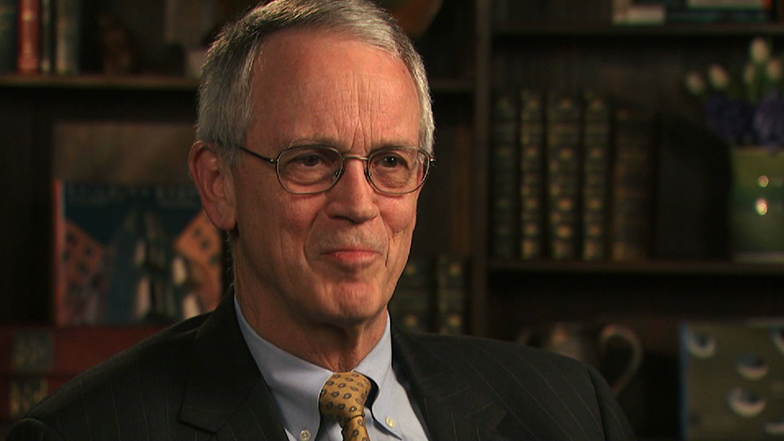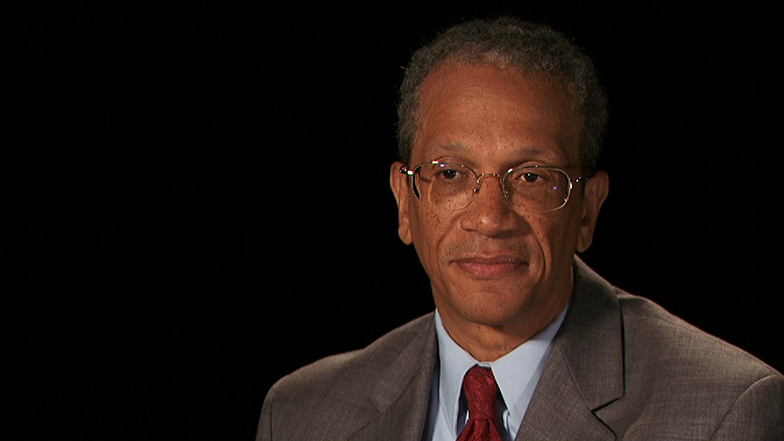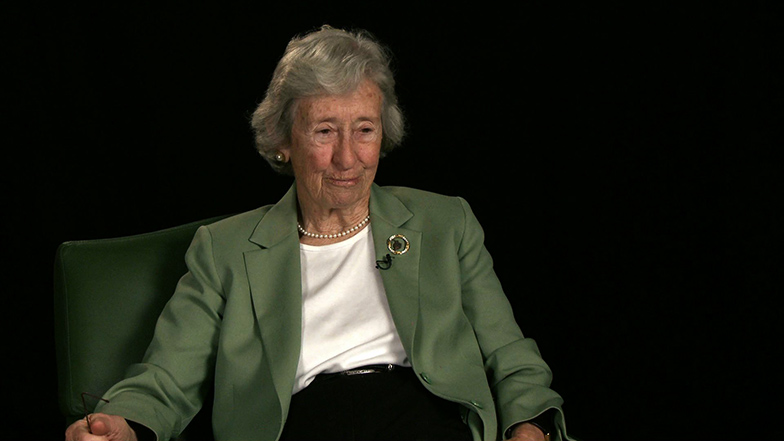David A. Mindell PhD ’96
INTERVIEWER: Today is September 23, 2010. I am Karen Arenson. We are talking this afternoon to David A. Mindell, the Dibner professor of the history of engineering and manufacturing, head of MIT's science, technology, and society department, and chair of MIT150 Anniversary Committee. He's also a professor of aeronautics and astronautics, housemaster for Edgerton House, a graduate student residence hall, and a MacVicar Faculty Fellow, an honor given for outstanding teaching.
He earned undergraduate degrees from Yale in both literature and electrical engineering, and a PhD from MIT in the science, technology, and society program. His research and writing have ranged widely, including the history of aviation and space exploration, the archaeology of deepwater shipwrecks, and the social implications of automation. He's also a private pilot. David, thank you for talking with us today. A couple of years ago, you were named chair of the committee responsible for shaping the program to mark MIT's 150th anniversary. Do celebrations like this matter, and what purposes do they serve?
MINDELL: Well, obviously they matter. We're putting a lot of effort into it, and a lot of time into it. And there's actually a small literature in the history of science on commemorations and anniversary celebrations. It's a little bit unsurprising, they're used as moments of definition and looking back as often a way to look forward as well, in that how you define the past, any moment sort of reflects how you want to define your own future, as a person or as an institution.
So yes, these moments matter. One hundred and fifty years as a long time, it's a sort of round number. Sesquicentennial, which is nice word, somehow people have trouble saying it, but I hope they say more of that as the time comes. And when Susan Hockfield asked me to do it, she was very clear. She said, you know, this is a chance to help the Institute define its vision for itself for the next century or so. So that's why I was willing to do it. I'm a historian, I'm interested in the history of MIT, but simply celebrating the history of MIT was probably a little too small a topic, and of mostly interest to all of us who are here and who have gone here. Whereas hopefully the future-looking part of it is of interest to the rest of the world, also.
INTERVIEWER: Did you start, as a historian, looking into this literature? And were there any particular celebrations that caught your interest, and you said wow, if maybe we could--?
MINDELL: No, I didn't look at the literature. I was already aware of the mid century convocation that MIT held in 1949, which I think was a very important moment. And I think I even gave a talk about it, at one point, to the alumni, 10 or 15 years ago. So that was the closest model that I had in my mind.
INTERVIEWER: The mandate to help the Institute define its vision of itself going forward is a big one. Do you feel that that's going to happen, and do you have more of a sense of what you think the vision is, or should be, going forward, now that you've been through some of the planning process?
MINDELL: I do hope it happens. I mean, I hope it happens intellectually as much as anything. You know, there's any number of administrative issues that people deal with, and that they will have to deal with in the next 50 years, are more of inside baseball kind of topics, I think, for administrators. But you know, what is the role of a place like this in the world we live in? It seems to have a role. I don't see the place dying on the vine. It seems to be thriving. But a lot of other great institutions are withering, and we're not immune from that. And I think things will change a lot, even in the next 10 years, much less the next 50. So it depends a little bit on how much the community takes up the task, and how they take up the task.
INTERVIEWER: You've been here about 20 years, now. How do you think about the role of this place, and has it changed over the time you've been here, your thinking about it, as as well as the role?
MINDELL: Well, they're both changed. I got a PhD in the history of technology, a fraction of which was a study of various things that had happened at MIT. So my understanding of the place has changed a lot in the last twenty years. And MIT has changed, too. I came here first as a grad student in 1991. The Cold War had just ended, or was ending. I didn't even know it at the time, but Chuck Vest was just also becoming president. And at the time, there was a lot of hand-wringing about the federal patron, particularly the defense part of it, going away. What would MIT do and be? How would it contribute to the competitiveness crisis that a lot of people felt the US was in the 1980s? And you know, this was before the internet, this was before a lot of the sort of prospects in biotech, these things were all happening, but under the surface, really. So in that sense, a lot changed.
I think it started before then, but there has been an explicit understanding of, and also articulation of, the role of the research university in economic growth, as much as anything, that's gained traction in the last 20 years. I think it started in the '80s, but it really became widespread. And MIT was a key node in the emergence of that idea, in the last half of the 20th century. And that really wasn't so much around when the '80s got started, I think. And we see that in our class that we teach on the history of MIT. They are not talking about the university as an engine of economic development really up until about that point. They're talking about supplying engineers to industry, and invention, and there are plenty of entrepreneurs around, but that sort of phrasing was a product of the '80s and then the '90s, and then it became very widespread.
So that's a huge change. And it has its problems and its tensions. It's not only for the better. So that's one big way I think of changes. There's a big swing toward industrial support for research, and there was a swing sort of back away from it, toward the federal government, again in the last 10 years. So of course, a lot has changed.
INTERVIEWER: So who else was on the committee, and how did you work together to think about what you wanted to do in the spring of 2011, and what did you wind up with that think are going to be important pieces?
MINDELL: The 150 Steering Committee?
INTERVIEWER: Correct.
MINDELL: Well, the actual list is a matter of record. But it was basically actually the broadest representation of people from the Institute on committee I've ever been on. President of the Graduate Student Council, president of the Undergraduate Student Council, alumni representative, associate deans from, I think, at least four schools, associate provost, the secretary of the Corporation, you know, very many of the sort of constituent groups on campus were represented. You don't see that that often on a committee.
And it was interesting, because we started our work in the fall of '08, and then there was this huge financial crisis. And I remember very distinctly, you know, as that was unfolding, hearing from people who had their eye on the endowment in real time, which I certainly don't claim to, really saying, this is a change in lifestyle for a generation. I first heard that in October of '08. And that really raised the question of, what should we do? Should we do anything? How should, what's appropriate?
That was really a huge question early on. And in a way, that was, I think, a good question, because it was focusing. And until that point it was a little overwhelming, in sort of classic MIT style, of the sky's the limit, you can do anything you want to, and we didn't have a budget developed. That was part of what we did for the first year. But there were many wacky ideas on the table, some of them very good ideas, and a few of them just didn't survive because of the financial crisis.
And over the course of that year-- and we were also handed a lot of things that had already been started. So this was not something, we were not the first people to think about the 150th. Is the book projects had already been commissioned and started, the oral history project had already been started. We weren't starting from scratch, by any stretch, but I think there was a feeling that we were hoping, literally, to be a steering committee, and coordinate and steer, and then formulate a few things. And I have endless lists of ideas that we'd come up with.
And you know, of those, both the projects that had been started and the ideas that came up, I felt that, certainly for me as chair of the committee, but it was also true for the faculty on the committee, that we had an obligation to make sure that the-- there are many things you can celebrate about MIT. Many of them are worth celebrating. But ultimately, the business of the place is ideas, and research, and education. And we felt an obligation to ensure that those ideals, and there's lots of variants of them, but we all pretty much agree on the core, were given a quite central place in the celebration.
And that's where the symposia series came out of. We can have symposia on the history of department x and the history of department y, and those will be fascinating to the people in or who graduated from those departments, but not that much interest of the rest of the world. And so the symposia are really, what's the best way to celebrate the things that we're good at? Get the people who are good at them to think them through, and talk them through, and focus on big problems, and think about, and hopefully make a little progress. And some of those may be from MIT, and some of them may not be, but if people walk away from the 150th and say, you know, wow, that was really the moment when issues of economics and finance really got hashed through and there was some progress made, that's, to me, the best tribute we can make, to--
INTERVIEWER: That's one of the symposia topics?
MINDELL: Yeah, that's the first one, actually. Finance, Economics, and Policy.
INTERVIEWER: Out of five or six, you decided?
MINDELL: Six, there are six.
INTERVIEWER: While you were chairing the committee, you mentioned that you've also been teaching a course on the history of MIT. What have you learned about the Institute and its history? Were there many surprises to you?
MINDELL: I should say a little bit about the background of that course because, I began, the first thing I asked for when I agreed to chair the committee was a copy of every book that's been written about MIT. And I have, it's about two shelves' worth. And I had read a few of them, but not too many of them. And you know, that's a big task, to read two shelves' worth of books while you're in the regular throes of your semester, anyway.
So often when I'm faced with a task like that, I say, I'm just going to teach a class on it, and then we'll all learn. And then I sort of started thinking about that, and thought it would be good to teach it during the spring term of the actual 150th. And actually, Roe Smith, who's a close friend in my department, he almost independently came to a similar, it was really a thought. And I said, I've been thinking about that, too. And then we got together and we realized, it was a couple of things.
First of all, there's been enough professional history written of MIT that you could teach a course on it. Because you couldn't really do it with just memoirs and commemorative volumes. That's not MIT-quality for the students to read. But there's been journal articles and other things, and not just us, in fact, very little of it is written by us MIT faculty, but our colleagues around have written a lot of good work that bears on the Institute. So there's enough there, which I think, 10 years ago, there wouldn't have been.
Secondly, it's a really good way to teach the history of American technology for the last 150 years. And Roe is a specialist in the 19th century, and I've more specialized in the 20th century, although I've done some 19th century, too. So we had a nice kind of joining of expertise. And you know, just the more we thought about it, the more it seemed like a no-brainer, really. And students, that was hypothetical at the time, now we know it for sure. Students are interested in the history of where they go to school. They really care about that.
And one thing I learned from teaching with Roe over the years, is, every class has an overt purpose and a covert purpose. The overt purpose of MIT is, you can talk about the dorms, talk about fraternities, and student organizations, and great presidents and things, and the covert purpose is a more subtle history of technology in general, the history of American science and technology viewed through the lens of what happened here, and the history of MIT viewed through the lens of larger-- And you have all the topics that, not all the topics in American history, but most of the stuff that Roe and I love. You have the Civil War, the First World World, you have big business, you have World War I, you have the '60s, the moon project, there's a lot of good stuff to encompass there.
So what have I learned about it, teaching it? One is that, I mean, I knew this for the 20th century, but I had not read much about Rogers. But the degree to which his own, the degree to which the founding of MIT was wrapped up in the great problems of the day, and in a sense all the issues of MIT have always been wrapped up in the great problems of the day. You know, William Barton Rogers, he was teaching at the University of Virginia. There's every reason that if he was such a visionary, which he was, that we should be celebrating the 150th anniversary of Virginia Institute of Technology. We're not. He decided that that was not the place he wanted to found his Institute.
And he moved to Boston, and he married a Boston abolitionist woman, and he became part of Northern-- you know, at the time, Boston was a hotbed of very, actually, radical abolitionist culture. And these things were all sort of wrapped up in how the Institute got started. And then, and we'll see this next spring, the poor guy finally gets this charter signed, and his thing is created, and two days later, this country falls apart into the most bitter conflict it's ever had.
And so the proximity of this very forward-looking vision with these very sort of concrete, real, political, cultural, racial, problems at the time, is profound. And then also just the basic, there are things that are embedded in the Institute from that original period, and his original vision, that are still there. And some of them are tensions that aren't going to go away. They're animating tensions. Some of them are just the culture of the place, and the things that you walk around, and you see on a day-to-day basis, that one deals with, positive or negative, or in one form or another have been around in every generation, in a way.
INTERVIEWER: Animating tensions like what?
MINDELL: The appropriate role for industry is a really good one. You know, how much of the Institute be focusing on fundamental problems, science problems, you know, although I like the word fundamental better, versus how much it should it be solving problems of immediate relevance to industry. And that's a pendulum that swings practically like clockwork on a 10-year time cycle. And there are advantages and disadvantages to both sides of that. And then the sort of educational mirror of that is, Mens et Manus? How should we be training our students? What is the right mix of practicality and theory, or classroom learning, or however you want to put it?
INTERVIEWER: Has that been a pendulum, too, or has that been more a sort of secular shift from one--?
MINDELL: I think it's been a pendulum. You know, all the emphasis on engineering science at the end of the Second World War, which was responsible for many great things, also left many graduates, and a lot of people felt, American engineering at the highest level, disconnected from the problems of American industry. And then a move, sort of beginning in the '80s, more toward thinking about systems, thinking about design as a component of engineering education, which are moves that go back to things that were done in the '10s and '20s, really kind of brought back in, a lot more practical kinds of things, and reconnected a lot of the engineering work with--
And you know, again, the compliment to that pendulum is the defense and the federal government pendulum, which has also been there from the beginning, and what is the relationship between the federal government, what is the role of military training on campus, what is the relationship between the armed services. You know, what is the relationship between big business. These are all things that have been there. And what are the demographics of the student body? Along class lines, along gender lines, along race lines. Those are all things that, one hopes there's been a progressive progress there, and I think there has. But it's also been sort of there from the beginning.
INTERVIEWER: In looking at one of the annual reports you have in the list of documents for the class, I was surprised by how many women there were in the earlier years. Not just one Ellen Swallow Richards, but a whole bunch of them quite early on. I think they were mostly special students, but--
MINDELL: Yeah. They were special students, I'm actually forgetting when they were formally fully admitted, but--
INTERVIEWER: 1880s, maybe, 1870s.
MINDELL: But that's certainly the case, yeah. When you look at the Ivies, my alma mater accepted women in 1969. And at MIT, there were never a lot, percentage-wise. But they were pretty consistently on campus, from--
INTERVIEWER: But there were a lot more in those early years, I think. And then, I don't know whether the numbers dropped as the number of special students went down, and they didn't become regular students in same numbers.
MINDELL: Yeah. And there were the home economics programs and things, and the special laboratories. I mean, the laboratory as a teaching unit is also something that you see from quite early in the beginning. And you know, and the tension between MIT and Harvard. You know, again, I think it's an animating tension to this day. People are very tense about it, sometimes, when we try to compete for faculty and stuff. But it probably makes both institutions better.
INTERVIEWER: In your two bookshelves of documents and writings about MIT, were there any that you particularly loved, or found especially interesting?
MINDELL: Well, I would go back to the first one I read, actually, which is the 100th anniversary volume of the electrical engineering department. Which is a remarkable book, for a commemorative book. A, because it was written by participants, but people took a lot of care with the articles in there. And I read the book when I was a graduate student, and it really helped me shape what became my dissertation book. And actually, one thing they did when they wrote that book, was they kept the original drafts of the articles, which are considerably longer, in the archives, and so I was able to use those. And you know, that's just a random example about how a book that was sort of handed out at the 100th anniversary party sort of survives as a great resource. And not too many other departments have those books.
I'm actually, my head has been away from the class for six months at this point, so it's hard for me to remember them.
INTERVIEWER: How about the student research projects, if we could stay on the class one minute longer? You had students find areas of student life that they wanted to research the history of. Did they focus on any areas that were not well-studied previously, and did they turn up anything that surprised you, or anything that actually seemed to add to what was known knowledge?
MINDELL: Student life hasn't been well-studied previously, in general. In fact, it's very hard to find out too much about student life before the age of our current alumni, in a way, when you can ask people, what did a dorm room look like, what was the background composition of the students who were here, what did daily life look like. That's not very well-documented. I hope it will become better documented as we move through the 150, and we're collecting some films and other things. But it's not been a subject of hardly any history.
You know, the best piece of the students was about the, I'm going to forget the actual name of the organization. The Arab students at MIT organization. This really interesting piece about all the ways that the politics of the Middle East, and the politics of U.S. relationships in the Middle East, brought certain students here at certain times, and the way that those politics helped sort of cement the core of that organization, how they related to Jewish students on campus, what those people then went back, in some cases, some of them stayed here for their careers, others went back to their home countries, and, you know, what that interaction is. It was a really interesting paper. That was just things I didn't know at all.
INTERVIEWER: Do you plan to do anything with those papers? Will they be put up on the web for the sesquicentennial?
MINDELL: I think we'll try to put some of them on the web. They are student papers. Not all of them are publication quality. That one happened to be. And there's, the MIT Rifle Team has a really interesting history. Because it used to be, all students had to take military training. So, you know, shooting pistols and rifles is an old part of an MIT education, and not just one more varsity sport that we have. That's, I'm sure, true of many--
INTERVIEWER: And why did students have to take guns?
MINDELL: That was part of the original idea of the Institution, and its national service component.
INTERVIEWER: From the 1860s?
MINDELL: I believe so, yeah. I mean, it was obviously obvious early on, and--
INTERVIEWER: I wonder if women were required.
MINDELL: I don't think so.
INTERVIEWER: There weren't very many. The phys. ed requirement for women didn't come along until, I think, the 1970s.
MINDELL: And I think the phys. ed requirement came out of this military training requirement. I think that's what it morphed into.
INTERVIEWER: Interesting. Are you planning to do any articles or a book about MIT? You've been delving so deeply into it, and thinking about it. Is it a tempting topic for you? MINDELL: Not necessarily. First of all I don't, I mean every-- not the first book I wrote, but the last two books I wrote had a big component about MIT in them. Partly because it's important, and partly because it's easy for me to study. But I'm wary of spending too much of my scholarly career writing about the place that I work. I don't have a whole lot of perspective on it at this point, and-- I mean, I am writing a series of articles and things for the 150th, and I'm sure there will be more of that. And I hope, maybe even one retrospective one about the process, and what we've learned in the process. So no, I don't--
INTERVIEWER: Advice for the 200th?
MINDELL: Or the 800th? Do I have advice for the 200th? Ask me in a year.
INTERVIEWER: Your course has a substantial amount of reading. In many weeks there's more than 150 fifty pages. Is that typical of humanities courses at MIT, and are students surprised by that?
MINDELL: Students are always surprised by the amount of reading in humanities courses at MIT. For some reason, they expect them to be easy. I don't know why that is. So I think that probably is typical for a humanities course at MIT. We always debate about how much we should cater to the students' expectations, versus hold their expectations high. Because that's what, humanities students read a lot. That's what they do. And if we want to be the best, we want to be MIT-quality in the humanities, as well as in sciences and engineering, we have to teach the way that excellent places teach the humanities. And you can't do the humanities without a lot of reading.
INTERVIEWER: And writing. You also require a substantial amount of writing. You have short papers almost every week, and two longer papers. How do you find your students' writing skills, and are they much better by the time they finish this class than when they started?
MINDELL: I find the students' writing skills generally pretty adequate. There were freshmen in the class, but there weren't a lot of freshmen. All of MIT puts a heavy emphasis on communication, so that I do think the Institute is mostly successful at bringing the level of the writing up.
It's always a funny line you get into, about how much remedial-- if someone really can't write, we refer them to a writing tutor, and we try to help them. But it's not, per se, a class that teaches writing. But we mostly ask them to write response papers, so they get in a practice of writing on a regular basis. And we don't grade them very harshly. We just want them to have the chance to communicate their ideas. Again, and this is something that goes back to the beginning, MIT's always had a big part of its requirements that are humanities and communications. And it always could be better, but I think that we do reasonably well on that score. Because any scientist and any engineer recognize the importance of those skills.
INTERVIEWER: I think the outside world thinks of MIT students as being so math and science-oriented that they don't think of them as capable of being literate, and writers. And yet their SAT scores on verbal are almost as high as on math. They're very high.
MINDELL: They only become narrow once they get here. They're not narrow when they come in.
INTERVIEWER: You've won prizes for your writing. What kinds of advice do you give your students about writing generally, and about writing about technical subjects, both for techie audiences and for lay audiences?
MINDELL: Use the active voice. Subject verb object is always a good structure. Can't go wrong on that one. I'm a pretty mechanical kind of thinker that way. And I actually think MIT students like that. I give them a little rules, follow these rules you're not going to go that badly wrong.
INTERVIEWER: The Mindell version of Strunk and White?
MINDELL: Yeah, some of them are just derived from Strunk and White, and similar kinds of things.
INTERVIEWER: Did learning more about MIT's history give you any ideas about where you think it should be headed in the coming years, for yourself?
MINDELL: You know, I used to be more hopeful than MIT would broaden his horizons beyond science and engineering. I've become less hopeful about that in the last seven or eight years or so. And if anything, I think the history makes me less hopeful about that. I don't think there's too much desire to do more than excel in science and engineering, pretty traditionally defined. I hope that changes. I think there have been times that it might have changed. And so learning about the history, I realized the ways that's come up before have been rejected, and the one or two times I've seen it were part of that longer story.
INTERVIEWER: And yet, MIT differs from a place like Caltech in that it has tried to make sure that its humanities and social sciences were first-rate, the same as the engineering and science. And I gather that there are new NRC rankings coming out next week, and I'm hearing that MIT has, in fact, continued to do really, really well in those non-science and engineering areas.
MINDELL: I think there are many, I mean, when you talk about social sciences, you have economics as a social science, and MIT's been incredibly strong there. Ditto for linguistics. The humanities has been a tougher one, and how you really think about truly integrating that in the engineering education, as opposed to being marginal to the kind of science core. And there's a whole other story about the attempt to revise the GIRs that I, and many people, poured many years into, then went pretty close to nowhere. People just didn't, enough people, at the right moment, really didn't want to change.
INTERVIEWER: So what would your MIT look like? In other words, you were talking descriptively in terms of, it hasn't, and you don't expect that it will. Normatively you sound like you think it should be different. What would your MIT look like?
MINDELL: Oh, I think properly structured, this is an example more than the whole thing, but engineering is a wonderful basis, is a sort of new liberal arts education. Where if you really have a good dose of the humanities and social sciences integrated with how you learn engineering, then that is a tremendously powerful way to send people into the world to do their thing. Much more so than a traditional liberal arts education, where there's a little bit of Physics for Poets added in. A lot of other places do it.
And there are ways that I think graduates, some of our engineering graduates are always going to be just tremendously outstanding people, and real leaders. And that will continue to the case. But on a broader scale, there's always still the same phenomenon, that they do very well in their careers for a while, and then they don't move up into the upper ranks, either of management or different kinds of leadership, or, count the number of engineers in Congress, and you know--
INTERVIEWER: How much do you think that's a question of education, and what does or doesn't happen while they're here for four years, and how much do you think it's a question of who gets admitted, and what kinds of skills and instincts they show at the front end?
MINDELL: Well, we have our choice of who we admit, so the admissions process is part of how you think about the education. We are the place that attracts the students who are most narrowly interested and narrowly excellent in the sciences and engineering. And you know, students know that. And students who aren't interested in that go to Stanford, or Harvard, or other places.
We could change the way that we are perceived in that. The admissions' office would be a big part of that. That sort of thing comes up, especially now that even the undergraduate population is going to be increased a little bit. Is there any attempt to rethink who's being admitted? No, is basically the answer that I've heard. So that's a chicken and an egg kind of thing.
Culture is a very difficult thing to change, I don't think you could change it top-down, but there is a strong culture among young graduates that hardcore, here's your science. And we enforce it by what we set as the requirements. How we schedule them, what kind of classrooms they go in. We went through all this with that thing, that these are the important things, and then all this other stuff is nice.
INTERVIEWER: That was part of the task force discussions?
MINDELL: Oh yeah. I mean, I don't have that experience in my personal teaching, but the individual experiences is different from what you select as the overall.
INTERVIEWER: You use the word integrate a couple of times. How would you go about integrating the humanistic education with the science and engineering in a way that's different from what's being done now, and have you tried it?
MINDELL: Yeah. I mean, that's a tall question. There's a lot of pieces to that. And you know, for example, the physics that we require now-- and, well, there are people who do this in ways. You can teach those subjects with an eye towards the applications, or the historical development, or the context. And where you treat those pieces, again, not as external but as core. And some people do. And a whole curriculum of that looks different, though. The requirements are such that the students have a common experience of the science subjects, and a very uncommon experience of the humanities and social science subjects. That's potentially something you could change. So there are all these different kinds of levers. And I don't want to get into the, because really, there's a lot of minutiae in those rules, which, some of them I've blocked out. But we're all much more familiar with it than we want to be from that experience.
INTERVIEWER: Right. Although there are very few colleges today that have a real common core of anything. MIT's an exception. But unless you go to St. John's or Columbia, it's hard to find a common humanities, arts, social sciences--
MINDELL: Absolutely. But the fact that here, it is in one area and not in another-- the two cultures divide is more healthy here than it should be.
INTERVIEWER: Let's go back to your own personal history. Tell us about where you were born and raised, about your family, and your childhood, what your parents did.
MINDELL: I was born on Long Island, and moved away when I was four. My father worked, he's an electro-optical engineer, and he worked in the defense industry building sort of aerial cameras in the '60s. And then, partly because of the post-Sputnik responses, a lot of that industry got converted into educational technologies, and at that point, we moved to Rochester, New York, which is a big optical city. And my father became a chief engineer at an old camera company called Graflex, and begin building educational filmstrips and slide projectors and things. And my mother was a teacher and writer, and later, an entrepreneur.
And so I grew up mostly in Rochester, New York, and benefited from a confluence of two things, maybe you could even say three things. The confluence I was going to speak of, was my father ran a big engineering lab, among other things. And they used to discard their old equipment. And he would bring it home, and we would fix it, and then we could use it. And also, right about when I got into junior high was when the Apple 2 came out. And the company my father worked for, he was trying to convince them to get into personal computers as educational technologies. So those things were around the house from very early on.
And the second confluence-- you know, it's always hard to look for roots-- was the confluence of the bicentennial and growing up in Pittsford, New York, which is a Erie Canal boomtown, which had a real sense of history around the bicentennial, but also more in general. And so I was always very interested in American history, and interested in machinery, and in particularly computers, and then I got into electronics from computers.
Because I started programming computers in seventh grade, but I never found the kind of hermetic world of the programmer itself interesting, and I started poking volt meters into the back of the computer, and gradually got the computer programs to flip switches on and off, and that got me very interested in electronics. And so I've always been, then, starting through junior high and high school, very interested in the borderline between analog and digital electronics, and the borderline between hardware and software, and in electronics. And I quit all my music lessons, and sort of found a level of attention for that that I'd never had before.
And my history with MIT is funny, because it starts right around then, too. Which was, my father took a summer course offered by the ILP in 1981, with what was then the Architecture Machine Group. And it was Nick Negroponte, and three or four of his other core people. And it was in August, and our family lived here for two weeks. Mostly my brother and I were sailing on the Charles River, and then one or two days my father had to go somewhere else for a business trip, and we sat in his place, and sort of saw this thing as it was just getting formulated.
INTERVIEWER: You were how old then, approximately?
MINDELL: I was fourteen. And that was my first contact with MIT. Although my father, he went to Brooklyn Polytech, so to him MIT was always the citadel. And the next year I actually came to Harvard for summer school to study electronics in the summer. But then when I started looking at colleges, I was very interested in the humanities, still. And I didn't come here because I didn't think it was broad enough.
And I went to Yale, because Yale was one of the only places you could study engineering as a major, without enrolling in a separate engineering school. Even at Princeton, you couldn't, it's a separate school, I think. And I went to Yale to be an electrical engineering major. But my freshman year, I had a really great, truly inspiring literature professor, who sort of suggested that I might think about that, and I ended up doing a double major in literature and electrical engineering. Which is, you know, my mom is a writer, my father's an engineer, it's not that surprising.
INTERVIEWER: Did your mother always work with you on your writing?
MINDELL: My mother taught me how to write, I never learned it on school.
INTERVIEWER: You were very good by that time you entered college.
MINDELL: Well, she always told me, which I sort of believe, I'm not a naturally good writer. But I've learned the discipline of it in a lot of ways, I can make it--
INTERVIEWER: Did you have any career goals as a child, or going through college?
MINDELL: Yeah, that was also-- my father worked for a big company, and his company got bought also right about 1981, and he basically was out of a job at age 50. And he consulted, and it was a very uncertain time. My brother and I were both heading off to college. And that was really what spurred my mother to start her business, which then supported the family for the next 20 years, for the most part.
INTERVIEWER: Some kind of educational technology?
MINDELL: Yeah, sort of doing corporate education, high-level reading and writing training skills, for people in companies. And women's classes, on women's communication skills. And actually, eventually, my father always did some engineering consulting, but he sort of folded it and did a lot of the back-office work for that business. And actually, so I always had this sense that I didn't want to work for a big company, because I thought they would turn their back on you at any time. And it's interesting, because a lot of my colleagues, my peers, are now learning that lesson in our forties, which I learned somewhat in my teens.
I did work for Xerox all four summers I was in college, and had very good experience there in these sort of corporate internships. I had a great mentor, you know, I got to fly all over to the world, and do this kind of work, but I never really wanted to do that when I finished college. But I really love engineering, and I love machines.
And I was always interested in aerospace and aviation. Hard to work in aerospace without working in defense, which I didn't really want to do, although I didn't mind parts of it. But a lot of that, too, is big corporate stuff, or was at the time.
INTERVIEWER: Where did the love of airplanes come from? Anywhere in particular?
MINDELL: My father always loved trains, and still to this day. But I think there were a couple experiences that he took us to, that I just became enamored of airplanes. And I flew in high school. I worked at a flying school and got paid in free flying lessons. So you had your pilot's license pretty early? No, I never finished my license till I was, about, after I got tenure. It was one of my few regrets, is that I didn't finish my license and start flying more when I was younger.
And so, you know, I always knew through college that I could support myself. I didn't have a lot of anxiety about making a living, and I always consulted on programming and stuff. It was easy. And so I wasn't just worried about getting a job. That wasn't a big concern. And actually, took a year off and was a ski instructor after I was in school. Because I knew I needed a little time to just let my education settle in, and think.
And around that same time, I became aware of the engineering stuff that was surrounding Woods Hole, and the robotics there. I mean, they had discovered the Titanic there. I sort of knew about it. I didn't pay a lot of attention. Oceans were just not my fascination. It just wasn't something I had grown up following, or being fascinated by. My brother's a biologist, he always loved that stuff. But the more I looked at the undersea world, the more it seemed very appealing. I had spend a little time in Wood's Hole as a kid, and it seemed like a way to be outside, and have some adventure, and do really interesting engineering, without-- I liked the idea of having a job in a research environment. That was not being a student. I didn't want to do that. I wanted a job at a university, and Woods Hole was very much like a university. And so it took me a year of lobbying, but I finally sort of talked my way in there.
INTERVIEWER: And what were you doing for them?
MINDELL: You know, there I was building computers, and building sonars, and building electronics. Which is everything I loved. I learned a lot very quickly. The guy who was my mentor, who I worked with very, very closely, still someone who advises graduate students from MIT, his grad students would struggle to get to see him for a couple hours in a month, and I was working with him eight hours a day, Dana Yoerger. He was just a first-rate, still is, engineer and engineering mind.
And we would go to sea three, four times a year, as part of this group, that was Bob Ballard's group, and also there, I mean, literally the Cold War ended there. I remember being in Woods Hole when the Berlin Wall came down. And that was a huge crisis for them, because the Navy was really the prime sponsor until right about then.
It was very technical work, and unlike space flight, which it was similar to, you got to take things out and try them. It was very experimental, and there was not a lot of formalism around it. So if something broke, you just brought it home, and you brought it back to sea three months later. And it was a very fortunate time I was there. I think there just a very tight group that worked together very closely, and somewhat to my surprise, most ocean engineers are mechanically trained, and mechanically inclined. So someone who could do electronics was a rare commodity for them. And so I just--
INTERVIEWER: And increasingly useful.
MINDELL: Yeah. And also, I could program, too. And for a while, quite a while, I was the lowest person on the totem pole, so I was cheap, so I got to go on all the really exciting trips. And so for a few years, I just traveled all over the world.
INTERVIEWER: But somehow you didn't see this as your career path. You didn't say, how can I stay in it? You veered off.
MINDELL: Yeah, I never expected to stay in that. And one thing I liked about it was, I felt like I wanted five years of real, serious engineering expertise. Because I didn't expect to stay in it. And from Dana, I really got two things. One of them was, he was a PhD who really knew how to use his knowledge in the world. Which was very attractive to me. Until then, I never really saw that I would be interested in getting a PhD.
But I didn't want to get it in engineering. I could see the career path there. Running a big lab and shoveling grant money in, it just seemed too predictable to me. And I'm not an academic engineer. I'm a very hands-on kind of industrial engineer. I am an academic historian, and I think about those things as an academic.
And then also, Dana was an MIT grad, and I used to go on ski trips with his fraternity brothers. And that was my first introduction to the sort of technical culture of MIT. And that was when I sort of began to put my eye on the place.
INTERVIEWER: To come back to your undergraduate experience at Yale, how similar or different do you think it really was from MIT undergraduate experience?
MINDELL: I think it was quite different. It was very much, and still is, a sort of basic science engineering education. You know, there were maybe 16 faculty in electrical engineering, there were 16 required courses, each one taught the thing they do. A lot of sort of basic theoretical work, not very good lab facilities, not very hands-on. I had a lot of that. I knew how to build electronics, and I did that on my own, all through college. So that was good for me, because I wasn't going to learn the theoretical stuff on my own. But it was not-- you didn't have colleagues starting companies, or going to work for interesting technology companies.
There were maybe six or eight electrical engineering majors in my year. It was much smaller and more peripheral as an engineering. It wasn't really an immersion in the culture that you get here. And you know, I think academically, intellectually, it was just as good as I would get, not quite as broad, in some ways, technically, as I would have gotten here. But it didn't have the same ties into it. Like the Woods Hole thing. I found that on my own. I didn't really find that through--
INTERVIEWER: But the rest of your Yale experience, your other courses, and your friends, and your activities. What was that like?
MINDELL: Well, you're always a little bit of an outlier as an engineering major there. But you also had to be more well-rounded, because the requirements for everybody, they're exactly the opposite of what they are here. They were lots of humanities and a little science. But most of my friends were not science majors. They were literature and other, and English majors and whatnot. I didn't really like it there all that much. I'm not sure I would have liked it anywhere when I was 20.
But I got a superlative education. And I knew it at the time, and I was ready for it. I didn't need two years to party after high school. I had had my fun in high school, and I was really ready for the kind of serious engagement. So I feel like I took very good advantage of what that place that offer. And you know, I remember my sophomore English class, the one with this guy, where I would walk out of his seminar, and say, wow, that was mind-blowing. I'm never going to think the same way again. And I did that every week for a whole year.
INTERVIEWER: You did a literature thesis undergraduate, didn't you?
MINDELL: On Gravity's Rainbow, which is a fairly engineering-y book. So my thesis really did combine the two things.
INTERVIEWER: How did you pick Gravity's Rainbow, other than the fact that it was sort of engineering-oriented? It was about rockets, and--
MINDELL: It was about rockets, and Pynchon was an engineer before he became a writer, so there was a lot of that substrate to it. And it's just a strange, trippy book. I was always interested in World War II, anyway, so it was sort of historical terrain I was familiar with, and it just seems difficult and inscrutable, and that was with sort of a fun challenge.
INTERVIEWER: When you went off to ski after Yale, did your parents say, good, we get it? Or did they say, oh my goodness, you know, Ivy League--
MINDELL: Yeah, they got it, they weren't worried.
INTERVIEWER: Did you take a bunch of literature books or history books with you?
MINDELL: Yeah, I took a lot of the books that I didn't finish in school, that I wanted to finish. I wrote magazine articles for Byte magazine. I even applied to graduate school. I didn't end up going. But my parents had no worries that I could support myself and make a living. I had worked very hard, because I worked a serious corporate job all four summers of college, and did a lot of consulting during the year, so I had no junior year abroad, or no semester off, or any of that kind of stuff. So I just needed a little breathing room.
INTERVIEWER: Looking back, do you think you should have taken a year abroad?
MINDELL: No. It was hard to do with engineering, and there was no reason to go anywhere. The educational opportunities there were so rich, that-- and by the last year, I was pretty aware, I was just like, better to take the time after. And when I was in Colorado, skiing, there were a lot of people who, A, their parents were deeply concerned about them going there, or they hadn't yet finished college, and their parents were very concerned. I was fine, I was still consulting for Xerox. Most of my friends were in restaurants and bartending at night, and I wasn't. I was just skiing and supporting myself, you know.
INTERVIEWER: So you went from there, Woods Hole, and then to MIT. How did you decide while you were working at Woods Hole, to go to MIT, and to do science, technology, and society, of all things?
MINDELL: Well, when I when majoring as an undergrad in literature and electrical engineering, people always used to tell me, what a great combination. One of these days, you're going to have to pick one. And at some point, probably either my senior year or the year after, I said, you know, I'm just going to not pick one, and see what happens. So I had that on my mind.
And actually the year I was in Colorado, before I got the job at Woods Hole, I applied to and was accepted to three graduate programs. One of them was in science writing, one of them was in the history of consciousness, and one of them was in English, where I could also do some engineering, where my undergraduate adviser had gone. And I visited all those programs, and tragically my undergraduate adviser died literally that week, very young and tragically. And I sort of said, I might want to do this, but I'd rather work at Woods Hole, and I can always apply again. And so I waited.
Then, as I said, working at Woods Hole made me want to get a PhD, and even made me interested in MIT, but not in engineering. And my undergraduate adviser had written, you should really pursue this interest in technology and literature. And the person you should go talk to is Leo Marx at MIT. He wrote the one book on the subject, and it's high time that book was made obsolete, was his letter to me.
So one day I just came here, and I called up Leo, and I also called Roe Smith, whose book I had read. And in the introduction to, it was an edited volume, he wrote, these are some interesting things for someone to study. And I thought, I could be the person who would study that. And I pictured Roe as this sort of lonely historian on the Killian Court, surrounded by dusty books at MIT, and nobody paid attention to him. And I went there. Turns out that wasn't the case. He was then heading this graduate program that had just started, and there was a lot of vitality around this. And I also used to hangout in the MIT press bookstore when I was in town. So I got the sense that there was a lot of interesting stuff on campus happening that would interest me.
And so they sort of said, well, you should apply to this program. We just started this PhD program. And you know, from Woods Hole, to come to MIT as a student was just very easy, institutionally. In fact, I was able to keep my job halftime there. They have the joint program, which I wasn't in, although they wanted me to come into it. And so it was just a very institutionally smooth thing to come to MIT while working at Woods Hole. And convenient, too. And that was sort of how I ended up here.
I didn't decide to be historian until a couple of years later. I thought I would do more literary-cultural studies with Leo. But once I got here, I decided that history was a old love of mine, and something that was more new, I had done a major in literature, that was more familiar to me at the time. While you're in grad school, you might as well learn something new.
INTERVIEWER: And did you work with Roe, or other historians, then, while you were doing your graduate studies?
MINDELL: I did. I worked with Roe, Leo, Tom Hughes, who was a visiting scholar here at the time, from Penn, and then this was also an interest and it played out in a way that is perfectly consistent with what I do now. Which was, I hadn't totally realized this.
But Dana Yoerger, who I worked with at Woods Hole, had been a student of Tom Sheridan up here, who's in aero and astro, and also, he's a professor, I think, of psychology and engineering, or something. And he had been a real, still is, a real leader, in thinking about telerobotics, and how you use remote kinds of systems. And that was really the kind of philosophy that had been implemented in the lab that I worked in at Woods Hole, that I had become acculturated in without really knowing I had been acculturated in it.
So when I came up here, I took Tom Sheridan's class, and he's just a great person in a lot of different ways, and so also I was very inspired by him. And that was the kind of thinking that got me looking at the history of cybernetics, and the sort of relationship between people and machines, and how those sort of things work over time.
INTERVIEWER: Did you have any concerns about going into a brand new program, in a field that wasn't really well-established across America, and whether there would be jobs afterwards, or what you would do?
MINDELL: No. I thought it was the biggest, vaguest thing I could think of to do, with the most unclear route to success. Which was what I was looking for. I got a lot of confidence from both Woods Hole and from Xerox that, you know, I'll be successful at what I put my hand to. Let's try something that's a big problem, that's going to take a long time, instead of something that's more concrete.
But I didn't necessarily want to be an academic. I didn't have much intention of being a professor. I knew I wanted to get the PhD. and that I wanted to do the work. I still thought I could end up in business. I thought I would end up in Washington. I was interested in policy. Like the Congressional Office of Technology Assessment, or that kind of place. And didn't have my eye, I didn't know there was a field in STS or the history of technology. Didn't interest me at all.
INTERVIEWER: Were you still thinking about maybe, until then you'd somehow juggled both sides of the aisle. That you kept being an engineer, you continued to work at Woods Hole. Were you thinking about, is there a way in my adult life I can somehow have both?
MINDELL: Yeah. First of all, I had a little consulting practice in engineering, right up through when I started writing my dissertation. And so I had built a sonar that I licensed to a company on the Cape, that we were very involved in getting that going. I had a little electronics lab, a lot of that connected to local companies that I was designing projects for through grad school. So that was all, and that was fine for me. Because again, I was a kind of an industrially-oriented electronics engineer.
INTERVIEWER: How did you find the time to do all that?
MINDELL: You know, it doesn't compete for me. They're just different skills. And so when I get too wrapped up in my general exams, I would write some computer code. It's very complimentary that way. I'm not a workaholic, by any stretch. And so yes, I always thought I would continue doing that. It was a little harder to really write the dissertation. Like, that was the only two summers for a very long time I didn't go to sea, was when I was really writing my thesis.
INTERVIEWER: And what was your thesis about?
MINDELL: It was about the kind of prehistory of cybernetics, and the origins of feedback control. And the relationship between feedback control and digital computing, and how they both kind of arose together, and how Norbert Wiener was a sort of latecomer in that story, rather than an originator of that story. And it was about the Servomechanisms Lab here, and Jay Forrester, and Gordon Brown, and a lot about radar in World War II, a lot about how different people have studied feedback in different places, but it wasn't until the war brought everybody together that they saw this larger thing.
So it was pretty technical by the standards as historians, in that it really got into, like, how radar really worked, and how people developed these theories. And you know, I like that stuff, and I liked writing about how these things worked. You know, my father once said to me, when he finally got when I was doing, he said, you really do what I always like to do. You figure out how things work. I said, yeah, that's what I do.
INTERVIEWER: So when did you decide to enter academia?
MINDELL: Only when the prospect of this particular job came up. This chair was being created. And I thought about whether I wanted to apply for a job in the department that I was just finishing my PhD in, but I figured, I did. I mean, I had an idea by then that I wanted to teach the history of technology within an engineering setting. So that, to be at an engineering school and do this kind of thing was a good job for me. And I always said, you know, the thing about academia is it's the only choice that doesn't rule out all the other choices. So that was a big part of it.
But I probably would've stayed in Boston over staying in academia at that point, or maybe gone to a few other places. But I didn't really enjoy living in Woods Hole as a life, when I was young and living there, and I don't think I would have moved to a place just for a job. But this particular job came up. It was an endowed chair, it was my first job, it was a pretty good prospect. And it took a year to actually get the offer, but that was one that seemed like a good place to be.
INTERVIEWER: What was it like to shift from being a student to a faculty member? What was your life like as a junior faculty member?
MINDELL: You know, that shift was fine, actually. A lot of people used to ask me that. You know, my teachers were then my colleagues, but they were still my mentors, which you'd need as a junior faculty member. Roe was an extraordinarily good mentor. Roz Williams was great mentor. You know, they never treated me like some lowly student or something.
The biggest difference was a kind of lifestyle difference of, I was a student where it felt sort of like, you should be totally immersed in this all the time. Now it's my job and I need to build the boundaries around my life versus my work, which is always a challenge around here. But that was mostly the biggest challenge of it. And my life as a junior faculty member was very nice, actually.
I also simultaneously, literally like the week I was finishing my dissertation, Bob Ballard, who had moved on from Woods Hole a couple years before, called me up and said, what are you doing? How would you like to do some archaeology? And I treated it like my kind of peripheral academic hobby, but I didn't so much realize it at the time, but a lot, I think, because of the legacy of people like Edgerton around here, MIT loved that work. I got grants for it, I got invited everywhere to speak about it, and so it became a little more central to my life as a junior faculty member than I would have expected it to be, because it was so popular. And it was a very exciting field. We really created a field.
INTERVIEWER: What were you doing for him or with him on this archaeology?
MINDELL: Well, at that time I was a junior faculty member, so I was a sort of co-PI on these expeditions. And then it was also a little coincidence. In 1997, we had a major expedition where we found some major shipwrecks off of Sicily, and we really learned how to treat them archaeologically. And we were viciously attacked by archaeologists for what we did, even based on one article that the New York Times wrote about it. And that got me to thinking, like, how do they know what the right way to do this is?
I had had an experience, in 1990, before I even started graduate school, where we worked on a wreck in Lake Ontario, with a woman named Margaret Rule, who had been the chief archaeologist in England on the Mary Rose. And she was really a great character, who-- and it was like a 45 minute ride out to the ship every morning, because we were staying on shore. So I got a lot of time to sit on the bow and talk to her. And she said to me at that point, and it really stuck with me. You know, one day someone is going to find a very important shipwreck in two miles' deep water. And nobody is going to know how to handle it properly, archaeologically. And that really stuck with me. And seven years later, that came to be true.
INTERVIEWER: And what was the big question or issue?
MINDELL: Well, some of it was just practice. Like, what it mean to do archaeology when you can't physically be there? Archaeologists could not get their head around that problem, because for them it was all about touch. And the STS point of view was very valuable there. So we really started holding conferences and sort of saying, what does it mean to do archaeology when it's only robots? Because there are a lot of interesting questions that are opened up.
And I mean, I think that's sort of the culture of MIT in the sense of like, what do you do when you're junior faculty? You start a field! That's what you're supposed to do. And I was able to do all that stuff. I didn't feel, I really never felt constrained or oppressed or particularly stressful about my promotion or tenure or anything as a junior faculty. I had a lot of freedom, is what I had. I had great students. I wasn't on a big money treadmill that I had to raise. So that's partly why I chose that path, was I could do things that were unusual and strange.
And it was sort of hard work personally, just because I was on the road a lot, but I was also single, and it was an okay time to do that. But it was plenty of fun. It's a harder job being tenured here than it is being junior here, I think.
INTERVIEWER: Did you have to do a lot of reading in archaeology when you started? How did you educate yourself, and learn about what it was you were looking at, or trying to think about?
MINDELL: Yeah, that's a good question. I'd actually taking a lot of classics as an undergrad. I did five years of Latin, and a fair amount of Bronze Age art history, just because I loved it and was fascinated by it. So I knew my way around the classical world, and I knew the difference between a second century A.D. wreck, which isn't that interesting to me, because there's a lot of Roman stuff out there, and an 800 B.C. wreck, which is more or less preliterate in the fields we were looking, and really tremendously exciting. And most of my technical colleagues didn't know that.
And also, the STS part of my training really allows you to go into a field and figure out what the structure and what the practice is, and some ways to help undermine it, because we were being told by the scuba diver archaeologists, we know how to do it and you don't know what you're doing. And I'd say, well, let's get you guys all in a room together, and we'll just talk about, what does it mean to excavate? And none of them would agree, and you could sort of lever that disagreement into a new way of thinking about it.
And underwater archaeologists-- this was sort of the shame of it-- I didn't feel were particularly good scholars. They were very particularistic and very descriptive. The classical archaeologists, sort of land archaeologists, were much more intellectually secure, and just better thinkers.
INTERVIEWER: Interpretive.
MINDELL: And there's many at Harvard who we really worked with, who were really just tremendously smart people. So we were able to basically establish-- first of all, we were always working with very good archaeologists, anyway. But don't tell us we don't know what we're doing. Because then we'll start to talk to you about what you're doing, and you probably don't know what you're doing at all, and we're at least thinking it through in an open way. And that was a lot of fun, very successful.
And the resources around here were just-- That was that was another big mental shift from graduate student to faculty member here was. As a graduate student, I felt like I was always sort of out, scouting, trying to scare up the intellectual resources that I needed for what I needed to do. And so you were in a kind of hunter-gatherer mode. As a faculty member, what you had access to was essentially infinite, financially and intellectually. And then it really put the onus on your own limits, and your own ability to do what you wanted to do. Which is not always an easy place for people to be, but I was not limited by-- nobody ever said, what are you doing, archaeology, when you're in STS and you're the professor of engineering and manufacturing? This place doesn't work that way.
INTERVIEWER: Were you conscious of being in a program that was not central to what MIT focused on, in other words, you weren't part of the engineering or the science faculty, per se, and do you think it mattered in any way? Did you feel marginalized in any way, or do you think your colleagues did?
MINDELL: I think my colleagues did and still do, and I actually strenuously object to that feeling. Because I never really felt that way. I was always teaching a course with Course 6, that was a lot of what I spent my time on. You know, I came to that job expecting, I'm going to have to talk to these engineers and explain to them why context and culture and history are important, and I have this whole thing prepared about that. And never had to do that at all. I got in with people, they were completely convinced. And these were, Course 6 people always thought were the most rigid, narrowly technical people at the Institute. They were totally convinced their students needed to learn the stuff. What they needed to know was how. How do you actually teach a class that will do this in the right kind of way? And that was a fun problem, and actually Jesus del Alamo, and Course 6 and I, really sort of clicked on that problem, and found--
INTERVIEWER: So how do you teach a course that does this?
MINDELL: Well, we put together this course, The Structure of Engineering Revolutions, which was a sort of case-based way to teach engineering, but where the students write the cases. So they had to go out and choose a particular innovation or particular lab, and write a history of it, and then present it in a whole variety of different ways, and you know, then think about all the ways that just solving the technical problem did not make the company a success, or did not even close the scientific debate on a problem, and so on and so forth.
I taught that for five or six years, always with but double-E faculty member, or EECS, who was usually not someone was particularly interested in social implications, or any of that stuff. But we always had a great time teaching it.
INTERVIEWER: How did you find them, or how did they find you? How did you come together?
MINDELL: They were assigned to me by the department. And you know, the first one I taught was with Charles Leiserson, who's a, at the time even, very senior computer scientist. And he said to me the first day, I mean, he wasn't being hostile, he was just like, you know, I'm not particularly interested in that sort of thing. But he sort of came to see over the course of the class, how just the way that ordinary routine technical research is infused by a lot of this stuff, that you know, that was very relevant for his own work in supercomputing and computational chess and stuff like that, that it was very-- we taught it together a number times after that.
INTERVIEWER: So how did that start? You had this idea that it might be a good thing to do, and went to someone at opposite department?
MINDELL: Pretty much. I was really hired to do that kind of teaching, to cross the boundary between the engineering school and STS.
INTERVIEWER: You were hired by whom?
MINDELL: The chair was defined that way. So that was my job, educationally.
INTERVIEWER: Whose idea was it? Where did it come from?
MINDELL: I think it was worked out between Roe Smith and the Dibner family, when they defined the chair. Because they originally wanted a chair in the business school, and he convinced them to put the chair in STS, and make it this. And I know the Dibner family very well, and was in touch with them during that time. And I was an electrical engineer, so I went over there. Roz was dean at the time. She helped point me to places and people, and the programs were going through some shifting they had at this five-year-- that's where you asked about was it graduate or undergraduate-- it was kind of right on the edge, because it was the fifth year undergrads who were staying for a master's degree. And when they initiated that program, they thought it would be broadening. But the way it played itself out was that broadening was signal processing, in addition to computer languages. And that wasn't broad enough. But they didn't know how to do a broadening class that would be what they called rigorous. And so we, this class was not my idea that I pushed on them, we developed it together, and it met the technical requirements for, I forget what the distribution was, in their master's thing.
INTERVIEWER: Do you know if anything like that still exists, here we are, this many years later?
MINDELL: Well, I teach other courses that are similar. I haven't taught that course for a while. But I've had students who came through who teach that course of other universities, and the model is still viable. And there are, you know, 50 case studies on the web that students wrote during those years, some of which are really good. One of them was just published as a book, actually.
INTERVIEWER: Which, was about?
MINDELL: It was a company called Infocom, which was an MIT spin-off company that built one of the first really popular computer games, called Zork. And it was a sort of profile of the company.
INTERVIEWER: Do you think that the STS faculty and students bridge the gap between science and engineering and the humanities more than professors in other areas of the humanities, just because so many STS faculty members were studying science and technology?
MINDELL: I think that's true. I think that others, there have been a lot of growth in other areas since then. I mean, on the one hand, I thought I was doing what I was doing and that MIT was supportive. Over the years, I learned that what I was doing very much was part of Philip Khoury's vision for the school. And there were other people who were also doing those kinds of things, whether in media studies or in other places.
And you know, the humanities is in crisis in the American universities in general, because it became so inward-looking and abstruse that it lost its relevance. Or so explicitly activist that it lost its scholarly orientation. And I came to think that engagement with science and technology, and STS, is the sort of savior of the humanities. Because there are fundamental humanistic questions that science and technology are raising all the time, and you can address them through a literature department, or through a media studies department, or other things, but that what MIT should be doing are those kinds of things. We should be the world leader in that kind of humanities.
INTERVIEWER: Do most of the STS students come in, as you did, with some kind of science or engineering background, or is that pretty unusual?
MINDELL: A lot of them, but not all. And after they hired me, we started to hire other faculty. David Kaiser does physics, David Jones is a medical doctor. And we don't exclusively hire faculty who have that kind of dual competence, but it is a model that works very well, especially around here. So I don't think they feel alienated from MIT. And I don't think it's constructive for anybody to feel that way.
And I've never been treated that way. And you know, somebody said to me, when I became tenured, that was when I got my dual appointment, first in engineering systems. And when that happened, they said to me, we're only willing to do it for you, because when we scratch you, you bleed like an engineer. So somehow, they were convinced that I was a genuine engineer.
INTERVIEWER: But among the faculty, you're alone in holding that joint appointment in engineering, I believe. And even in the humanities, while there are a couple of professors who have a foot in the sciences, I think it's not as full professors. So how did your joint appointment happen? Was this the Dibner again, and who ran interference?
MINDELL: So it's actually a dual appointment, which is a minor technicality. A joint appointment is more common, as sort of a courtesy letterhead appointment, and the dual appointment is, you really have a half- foot in each department.
INTERVIEWER: So you go to the faculty meetings, and--
MINDELL: And I am the only dual faculty member between Engineering, and the Humanities and Social Sciences School. And this is an old story, because it's not the same dean anymore, but when that appointment was created, the dean made them sign a paper that they would never do that again!
INTERVIEWER: The dean of engineering?
MINDELL: Yeah! But the way it came about was, the engineering systems division was forming sort of about halfway through my junior faculty life. And Tom Hughes had had some involvement with them, and they were a little bit on the gray side, and they didn't have a lot of young people. And they sort of started appearing at my office, just to chat. And you know, they had a pretty broad view of engineering at the time, and they really wanted to integrate the social sciences. And I started going to their sort of formative meetings, and then it was actually formed as a division. And then at some point, it was a few years yet, but I was sort of treated as a regular faculty member, but I didn't have to dual appointment. Which you don't want for-- I needed to go through the tenure process in the way that I started. But then we understood, and it happened, and since I got tenure, I got that dual appointment with them, and started teaching their doctoral seminars. I was quite involved for the first number of years on that.
INTERVIEWER: How do you manage to stay current in engineering?
MINDELL: I read a lot. You know, I follow a lot of industry developments. I follow a few things in the more technical way, like I follow electronics pretty well, and more lately things like avionics and automation and robotics. And these things I just always follow. They're just what interests me, and what I read over the breakfast table. My two year old daughter will now sit at breakfast and say, want to read an airplane magazine? And we read airplane magazines together over breakfast. You know, I'm not technically current in the way that people at CSAIL are with what they're doing. But you know, at some point, and it was probably right around when I joined ESP, I realized, I know a lot about engineering. And all through this, I was also still building my sonars.
And just generally my years here, plus my academic training, whatever it was in, you know, I needed to learn about spread spectrum signaling, which was something I knew nothing about. So I picked up a textbook, and I sat with MATLAB, and I taught it to myself. And I made a new spectrum sonar. That's what I learned how to do as a researcher.
And so there a lot of things that I'm not that current on, but I know that if I need to, I can get to it. And I'm interested in it, and if anything, you know, some of my STS grad student colleagues said some very wise things when we were going through, one of which was, you know, STS is not a discipline for people who are trying to escape from sciences and engineering. In fact, if it works well, it should make people more interested in science and engineering, because it shows it to be more interesting as an activity than it is a sometimes portrayed as. And I certainly felt that way.
And you know, then just sort of having the broad scope, and you know, I've been through all the engineering documents on Apollo. I understand how that works. Yeah, that was 40 years ago, but most people still don't understand how that works. And not just at the level of the bits and the buttons, but also at the level of the policy, and the planning, and the management, and the politics, and operators, and you know, that sort of thing.
INTERVIEWER: Is the culture of the aero and astro department, where you now have one foot, very different from the culture of your STS department, and do you bring anything back to the management of the STS department from watching aero and astro run?
MINDELL: Yeah, that's a really good question, actually. aero and astro is a is the first-in-the-world department, in both undergrad and grad, and it behaves that way. And I really love that about it. I'm not always sure that the humanities at MIT behave that way. And I really try and make my, to the degree that I have any influence, make the department run that way.
INTERVIEWER: Which means what kinds of things? I mean, what type of behavior is different, for example?
MINDELL: Well, not everyone passes their exams all the time. Not everybody gets promoted all the time, just because they're nice people. That's a difficult thing to do, but that's how excellent departments behave. It's a very different department, just by the nature of people run big laboratories, the structure of things are different, the sizes are a little different. One of my favorite things about aero now is just, being a run of the mill faculty member, and not having to run the meetings, and not having to be the department head. It feels like a great luxury. And it's been, because I've been head in STS, I haven't done a whole lot of admissions, and promotions, and sort of departmental functions in aero. Yet, I've only joined it about a year ago.
INTERVIEWER: So tell us about the STS program, and how it's evolved. Where it was when you became head, and what you're trying to do it, whether you have an agenda or a process, or whatever?
MINDELL: I do have an agenda. I've had an agenda. I'm not sure how much room there is for an agenda right now, so I've backed off on it. Because I think MIT really should be the leader in educating people who are really, truly dual competent in some science and some humanities. And that there are enormous potentials for that. But I don't think I can really do that within the context of the STS program. Not so much because of the program, actually, we have great faculty, and it's a program that was rather fractious over the years, even when I was in it, but it's not fractious now, which is a really nice thing about it.
You know, again, most of the senior faculty-- I'm 44, and the next oldest person is 62, and then there's a lot of people between 62 and 70. And they're all people who were there when I started it, not all, but mostly people who were there when I was a graduate student. But they're very supportive of me as a head. Partly because--
INTERVIEWER: You're the only professor in the department younger than 62?
MINDELL: Yeah.
INTERVIEWER: The only faculty member, or the only tenured full professor, or and the only what?
MINDELL: Oh. Behind me is a very good, very deep bench. So there's one other tenured person who's a few years younger than me, and then we have five junior faculty. So we're very, very strong in the up and coming part.
INTERVIEWER: So you have some junior faculty?
MINDELL: Oh yeah. More than there ever were in my 20 years in the department, which is great. And a lot of my job is making sure they get what they need to get their work done. But it's a, sometimes people call it, it's a barbell effect that's pretty common around MIT. ESD has a problem, too. There are very few young full professors right now. I don't really know why that is, but there are very few.
INTERVIEWER: In terms of the, you talked about having an agenda, but not being sure that this was a time. Is that a financial-economic issue, or--?
MINDELL: I don't think so, so much. I think MIT has a few pockets of places, where we are doing things that you can't do anywhere else. Even in humanities and social sciences, like media studies is one place like that. There other people in literature and other places that are doing really exciting things, that you can only do at MIT, or you can only do best at MIT. And those are the things that we should be running with. And those people are very happy here, because they're the best place in the world for what they do.
And yet, the structure of the school that we're in is still a structure from the 1940s of the old-style humanities, which I'm a big supporter of. I mean, I love the classics, and I've studied all that stuff, and I think it's a great place for it. But it's mixed up in a way that it has put intention. And so people who are doing more traditional types of humanities are nervous about what you might call the new humanities, for lack of a better term, and the new humanities are constantly pulled back into very traditional disciplinary borders that they don't really fit into.
And the programs are all structured in these antiquated ways, and nobody has a vision to put that together, and clean it up, in a way that is going to make it shine. It's extremely clear to me what those things need to be done, but I've said my piece many times, and it's not happening.
INTERVIEWER: Let's talk about your research interests. How did you become interested in the interaction of humans and machines, which I think has been one of your themes?
MINDELL: I mean, I guess there's two ways to describe it. One is as a humanist and as an engineer, it seems like the logical place where these things meet. It wasn't really ever quite so conscious. A lot of it was when I was at Woods Hole, Woods Hole had been diving a submarine called Alvin, which it still is using, that had been around since the '60s. It was already 25- years- old at that point. And three people visit the seafloor in Alvin. And it was a very successful vehicle, still is. Scientifically, and it's a public icon, really. And I grew up watching those National Geographic shows.
And when we came along, and it was really in the late '80s, and I joined sort of in the second part of this evolution, we introduced a robot called Jason, which people don't go down, but have a fiber optic cable that goes up to the surface. And it connects to a control room on the surface. And it was really Bob Ballard, who had been one of the major forces behind Alvin, who then kind of broke away to these remote vehicles. And he said, and we all sort of said, robots are going to be cheaper, and they're going to be safer. And then Bob would say, we're going to put Alvin out of business. Because there were institutional politics there.
Well, we built this vehicle, I mean, again, it was mostly finished when I got there, but we rebuilt it and made it operational. And it turned out that it was neither of those things. It wasn't cheaper and it wasn't safer. It wasn't cheaper because it stayed down for 24 hours a day, seven days a week. So you needed three full shifts of people to keep it going. And that's where the expense comes in. Whereas Alvin would go down at eight in the morning and come up for dinner at five at night, and have one day. Jason got a lot more hours on the bottom, but the bean counters in Washington didn't know hours on the bottom. They just knew the day rate, and the day rate was expensive.
INTERVIEWER: You tell them they should be looking at cost per hour?
MINDELL: Yeah, no, over the years that stuff came through. And then, they weren't safer, because A, Alvin was very safe, and had a very good safety record, and still does. And B, we had hidden dangers, where you have a steel cable with 30,000 pound tension on it and 3,500 volts going into a big vat of salt water, that's not a very safe situation, and we had some very uncomfortable close calls. And actually, the dangers in a remote system were hidden in ways that were maybe scarier, because they weren't-- you have three people in danger in a sub, there's a lot of focus on keeping them safe. Whereas with these vehicles, it was just different. And you have one accident, and if you sell yourself as safer, you're out of business.
But what totally surprised us, although I think Ballard saw this from very early on, I give him a lot of credit for that, was that it fundamentally changed the nature of the work. Because when people would dive to the sea floor, you'd have one pilot, two scientist crew members, and they would go down, they'd come up at the end of the day, and they'd have a big meeting and tell everyone what they saw, usually by showing them video. And then usually the next day, you'd send one person who went the day before, and one new pair of eyeballs. So every day with Alvin, you would expose the seafloor to one new pair of eyeballs.
With Jason, you had a room the size of this room with big TV monitors on the walls, and the entire scientific party was there in real time, all the time. So you had a 24-hour real-time similar with the whole group, which could be 40 people. Or if you came across a critter that you didn't know what it was, you went and woke up the biologist, and you brought them out, and he told you, she told you. And that was a very different way to work, and changed the practice of doing science. And we really grappled with A, communicating that to people, and B, what the implications of that were. So the idea of going from human to remote was not what anybody had expected, and was stranger than people had imagined. And that really stuck with me. And then we were going to autonomous vehicles, and yet there was no one who knew how to talk about that, in a professional, scholarly, or research-rigorous way. It had everything to do with, how effective they were, how they should be designed, how the work got done, who did the work, and you know, professional identity of the-- I mean, still people ask me, so do you dive? Well, I have dived in these submarines, but mostly I do robots. But that's not what people ask you about. It's like, where does your body go, that's what the cultural valence of it is. And that question just sort of stuck with me.
And then as I started looking at the historical stuff, even way back into the Civil War, with the same sort of thing, where, you know, gee, when you go to sea in an ironclad warship, you know, yeah, it's nice to be safe, but actually, you might die from the thing itself, instead of the enemy. Or suddenly the engineers are more important than the old style sailor officers are. And these were social changes around this technical change that were just completely interlocked, right down to the level of the engineering. And that was what, there's always something--
INTERVIEWER: So you were deeply involved in this deep sea stuff. How did you get into outer space all of a sudden, with your research?
MINDELL: That's a good question. Well, first of all there's always been--
INTERVIEWER: Deep sea, deep space?
MINDELL: Yeah, the analogies are always there. I mean, they're both isolated environments where you can study things. There's a lot at stake, it's very dangerous, and there's not much else around. Whereas you study a company, or you have all these messy, complicating things in daily life that are overlapping, whatever the phenomenon you're looking at. So one of the older guys in STS used to say, studying a ship is like a society placed under laboratory conditions, which I always thought was nice. But then, you know, it came down to it that I never really loved the sea. And I think I was good at that job, partly because of that. I didn't have a lot of emotional identity stuff wrapped up in ships and submarines, and so I was able to be-- everyone I worked with, whatever they did, they knew they would be living on the shore, and going to sea, and sailing in their spare time, and stuff.
And I always sort of liked that, but I didn't-- ships were never things that really interested me. I don't really like, they're kind of dirty, they smell bad, I don't sleep well on them. I like the under, in the ocean. But the surface of the oceans-- A. And B, after fifteen years, and doing the Lusitania, and the wrecks in Guadalcanal, and Battle of Midway, and then finding some of these really ancient ships, there wasn't that much more that was going to be-- and the one more thing is the project we have next year-- so that's A.
And then so I sort of said, well, I really like airplanes and space flight. I should be spending my time on that. And it's something new, something that I'd always been interested in, something I always sort of studied. And a lot of issues were still there. In fact, Tom Sheridan, you know, my teacher had worked on that stuff. There was a good MIT connection. And actually, it was one of the projects the students did the first year I taught, that Structure of Engineering Revolutions class, was the Apollo guidance computer, which had been built here. And I was a good little test I suggested to them, to see how it would go.
And then sort of one thing led to another, and I started flying again when I was writing the Apollo book, and that just deeply grabbed me. And I would kick myself for not realizing this earlier, but all the skills I learned in navigating submarines, and all the skills I learned from the pilots of the submarines, were things that were directly transferable to flying aircraft, and that sort of thing.
INTERVIEWER: So coming back to MIT, were they transferrable to some of these MIT committees you've served on? You've been on a lot of search committees, for example. For the dean for undergraduate education, and the dean for humanities, arts, and social sciences, the director of engineering systems division, and knight science journalism fellows director. Are you a good searcher, are you just not good at saying no? Tell us about that.
MINDELL: Well, you know, it's interesting. Those were all within a two year period, and that was a two year period where I was junior enough that I wouldn't have been considered for any of those, but senior enough that I could sit on, I think you needed to be a full professor or whatever. So that was probably a historical coincidence that I happened to be on a lot of things for a short period of time. And you know, there aren't that many dean search committees. Who knows what'll happen next time around.
And you know, I've always had a life at the Institute. That's one way I dealt with not feeling isolated in the humanities or in STS, was I like doing things that were MIT overall. Because I have colleagues who literally say, you know, I told the dean I would take this job, but only if I never had to talk to any of those people on that side of campus. And I just sort of think, why are you here if you feel that way? And I don't feel that way at all.
INTERVIEWER: You don't give them tenure, right?
MINDELL: Oh, these are long tenured people. I just don't feel that way. And you know, I do find the Institution interesting, the way that it works, and the politics, and the relationships.
INTERVIEWER: What did you learn by serving on these committees? Were there any sort of, gee whiz, I didn't realize the Institute worked that way, or that universities work that way, or?
MINDELL: I learned about what MIT cares about and what it doesn't care about.
INTERVIEWER: Which is?
MINDELL: I'll leave it at that for the moment. I don't want to get to specific! And I think that through all that stuff, and everybody gets this, there's just a slow accumulation of learning process, learning the other people who are around in the years that you're around, learning how things get done. You know, the 150th takes advantage of a lot of that, and also I gain a lot of that, just from seeing how things work in some of these processes.
INTERVIEWER: But you're able to bring to bear your discipline, as well as the knowledge of MIT and processes. I mean, you're a historian, and you've looked at MIT and its history in some of your work. You dipped into MIT in another really serious way in your decision to become housemaster with your wife, at the residence hall. What made you interested in that position? And what's it been like?
MINDELL: That's an easy answer, actually. STS has always had a lot of grad students who are GRTs, including, for a while, two or three of mine. Graduate Resident Tutors who live in the undergraduate dorms. One of them convinced Roe Smith to become a housemaster. And Roe said to me after he did it for a year, this is the best thing I've done in my entire academic career. Which got my attention. And then my very good friend Dava Newman and her husband became housemasters at Baker. And I was like, you guys are housemasters? I thought that's for, like, people five years from retirement. No, they're sort of bringing the age down. So that got me interested. Plus now there were other people who were housemasters, who I liked, who were my friends, who I would like to work with in that setting.
And then the first year I was department head, it happen to be, we were getting married that year. And so we knew we had to move. I hadn't moved for 11 years that point. And it's I think it's a hard thing to contemplate if it's not the time in your life, we were already thinking about moving. And Roe asked me to express some interest. And you know, it took a while, we weren't sure. There was the new W1 dorm was set to open. That's really what they wanted us to do, but we didn't feel like we could do the undergraduate housemaster. But Edgerton was there, and one thing sort of led to another.
And I think now it's a much more involved process, because a lot of people are very interested in it. At the time, which wasn't that long ago, this was only four years ago, there wasn't that much interest, and they actually had to recruit for people who they wanted.
And I also think, my wife had gone to Yale for graduate school, I was undergrad there, and Susan Hockfield was here just for a year or two then, but I think she sort of shared a vision with us about the role of the house, and what a housemaster could be, as far as helping to create an intellectual community. So there was some resonance there with how things, you know, MIT is not Yale, it doesn't need to be. But there are things about how those things are structured that-- and you know, it all sort of came together.
And I was also, I'm on campus all the time now. When I was just a professor, I was only here a few days a week, but as department head, I'm here all the time, anyway. So the closer and more convenient, the better.
INTERVIEWER: So is it fun?
MINDELL: Yeah, it's fun. As everyone says, it's a whole different side of MIT. You see the housing, and counseling, and facilities infrastructure, which is interesting to see how it works. You see the students, we have graduate students, and I mostly advise graduate students. So you see the side of their life that's very different, even though I was one. It was a long time ago and it was different. And you learn a lot about what MIT is up to, just by talking to the students. Because you ask them about their work, and it's a pretty good survey of what's happening on the campus. You know, we really like the other housemasters. It's interesting, we're raising our daughter--
INTERVIEWER: Do they get together and talk?
MINDELL: Yeah, we get together once a month for dinner, and then once a month for a breakfast meeting, so we see them a fair amount. It's actually a very social group.
INTERVIEWER: What are the biggest issues facing housemasters these days?
MINDELL: The things that dominate the meetings are almost always undergraduate issues, like drinking, and other stuff that actually we don't deal with much. To me, the dominant issue is sort of, as MIT seeks to build more graduate student life, what's the appropriate balance of that with the academic side of things? Because that's really, when it comes down to it, our job as housemasters is, we're the only people in the house who are professors, who connect to the other faculty and the academic processes on campus. And that comes in handy a lot when a student is fretting about their exams, or needs some relief from this or that. And so, but a lot of the students, you know, graduate student life is a lot of fun, and it's a great thing and it's very supportive for them, but it can sometimes, as the person who writes the checks for the students on the other side of campus, you know, it gets to be expensive.
INTERVIEWER: Has being a housemaster shaped how you relate to your students in the STS program, or aero and astro? In other words, how you relate to the academic students you work with? Once you understand their lives a little more, as people?
MINDELL: I think, maybe, yes and no. I mean, I was a student here, and I was a student in the program that I advise in, not in aero-astro, but so in that sense, I have a sense for it there. I've never had a student who I advise directly who's been in Edgerton House yet. That's just been a coincidence. But I certainly encounter my advisees and other students in the course of this work. And I wouldn't say so much, but I always try to take care to relate to them as people, and know their families, and their family situations. And you know, it's a long-term relationship when you advise a PhD. I don't do that many at once. They're pretty engaged, I think.
INTERVIEWER: You were named a MacVicar Faculty Fellow in 2001. It's 10- year fellowship for your contributions to teaching, and undergraduate education. So tell us about your teaching style, and has it changed over the years, and how much is it based on a Yale teaching style, as supposed to an MIT teaching style, if there is such a thing?
MINDELL: Well, you know, I don't really like classroom teaching, and I never really learned very well in a classroom. So I try to avoid the traditional chalk and talk sort of teaching. I just don't do it. I like teaching in seminars, and that most of the graduate teaching takes place that way. And even undergraduate. You know, it's fun to teach undergraduate seminars here, because it's really strange for the undergraduates, and it's a very different format, and they tend to like it, once they get adjusted to it.
INTERVIEWER: Involves, what? More discussion by the students?
MINDELL: Discussion, smaller classes, one time three hour meeting, sort of thing. You just need the chocolate and the cookies right at the hour and a half point. You try to wait for two hours, you lose them. I used to try, well, maybe it's an hour in, we'll have the break now.
INTERVIEWER: That's how you become a MacVicar fellow? Chocolate?
MINDELL: And you lose them at the end. And again, I think a lot of the work is sort of project-based. I think it's true in the humanities in general, but I don't tend to teach classes where there's a strict set of material that you need to just know, and not question. We much more try to think, teach analytical skills, and ways of seeing things. And so it's not like, a lot of the, not all, but a lot of the conversation around the GIRs is, there is a fixed amount of material that needs to be delivered into those little heads. How do we do it in the most efficient way? We don't really have that in our fields.
And so I like the out of classroom teaching. That's why I like graduate advising. I take students to sea a lot. You know, just seeing them in different settings, informally and frequently, I think is really valuable, or around a particular problem you're solving. And I think those things are all pretty, I'm not alone in any of that on this campus.
INTERVIEWER: No, but there's a small group of MacVicar Fellows. It's a select.
MINDELL: Yeah. But we're also elected for different reasons, I do think. And some people really are just outstanding classroom teachers, and some students really learn well there, and that's as it should be. But that was never my style.
INTERVIEWER: Do the MacVicar Fellows get together and discuss their teaching methods, and have you learned anything?
MINDELL: Yeah, there's a lunch once a month or something.
INTERVIEWER: Do you change anything about your own approach to classrooms from the conversations you've had, picked up any good ideas?
MINDELL: That's harder to say, partly because they're pretty social, the MacVicar lunches, A. Or they're sort of presentations on educational policy things. So we don't talk too much about, I teach this way or that way. We don't see each other teach a lot on this campus. It's interesting.
INTERVIEWER: You once developed and taught a course for graduate students called Leading an Extraordinary Life. What was that about, what led to its creation, and do you feel like your life could be summed up that way?
MINDELL: That class, well, I'll answer in not quite that order. A friend of mine is a coach in New York. She coaches mostly corporate clients. Fabulously successful, CEOs and CTOs who feel that they are not, you know, they're making tons of money but their marriage is falling apart. Or you know, they're succeeding in their career, but they drink too much, or don't have a good relationship with their children, or any number of other things. And so she is an extraordinary person, just as an individual, but manages to get people to sort of develop plans to get from where they are, to where they want to be, and to stick to those plans.
And she was always interested in getting into the educational world. Mostly because of her sort of mission in life. It's not the business that's going to direct her there. And so we started talking about doing something at MIT. And I also thought that the technique of the way that they do it, which is extremely practical, and like writing lists of things and making plans, and just suits how MIT students like to see the world. And I saw a lot of dysfunction among the student body.
And so we just sort of made up this class, called Living an Extraordinary Life, which is intended to be sort of vague and all-encompassing. And it had a one-paragraph description for IAP one year, which was also intended to be a little bit vague. And it got a great turnout, and people really came, and they sort of stuck to it. And so now, I haven't been doing it as much, but they're doing it for the fifth year now. I've started to do it, and I always intended to do it, in Edgerton House.
But the person who's leading it now in Edgerton House is someone who took a class here the first few years, got her PhD in Biology, met the man she's going to marry in that class, and now is a full-time coach, sort of specializing in science and engineering people who want to achieve goals that they have trouble achieving. And so we'll see how that, I think it will play out very well. I know it will, because it started last spring for the students.
And I just think MIT does generally a pretty poor job of the tending to students' overall lives, and the balance of their lives. And many of the students here are not very good at that, either by nature or the lifestyle leads them that way. And what's interesting about this class is that MIT can't find a place for it. Everywhere we go, people say, oh yeah, that's great. We really need that. And boy, I have thousands of pages of the homework assignments the students write about their relationships with their advisors, and what they're doing here, and the questions they have. And it's very important for MIT to know, but it hasn't yet found a place, other than the kind of personal project of one faculty member. And so we're hoping maybe someday it'll find a place to live within the structure of the various deans' offices and things. But it's hard to tell MIT that they don't know everything.
INTERVIEWER: Good luck! We are out of time. Thank you very much for the interesting conversation. Good luck with the sesquicentennial.
MINDELL: Thank you!
